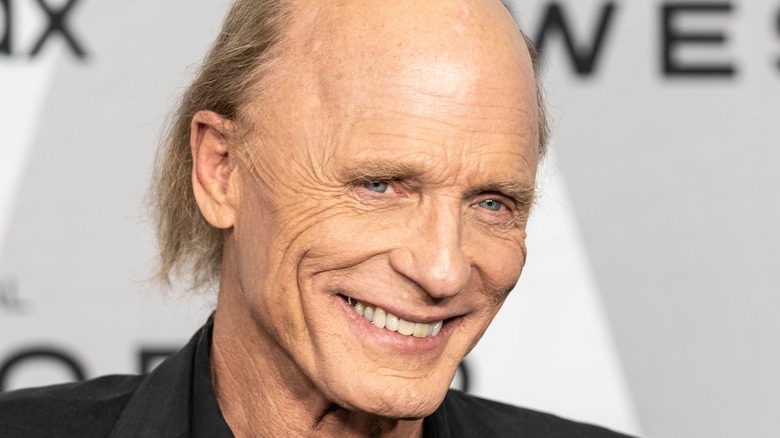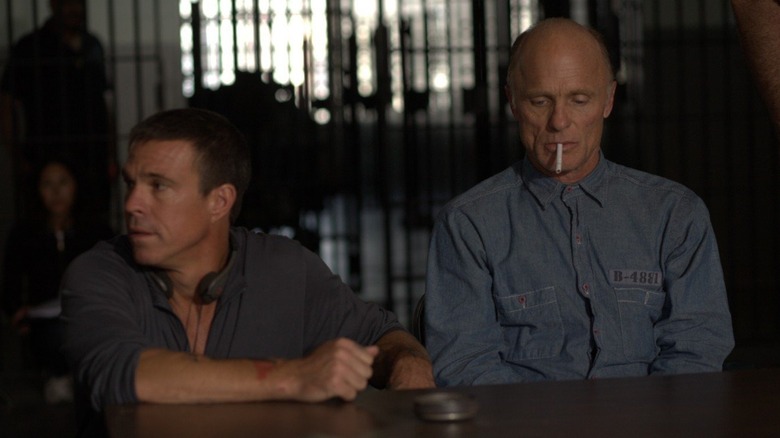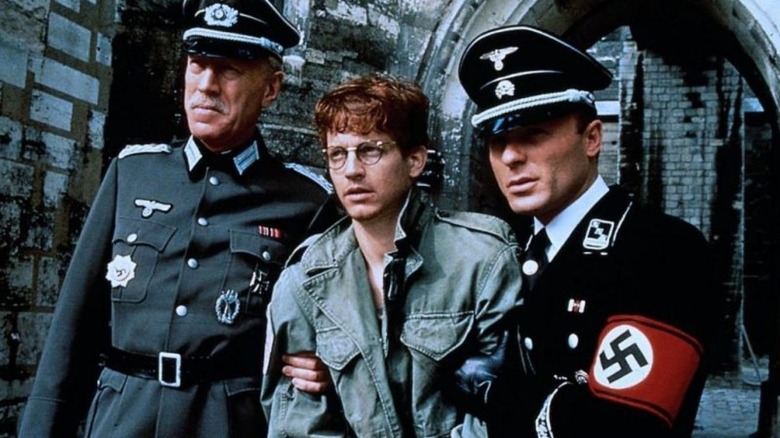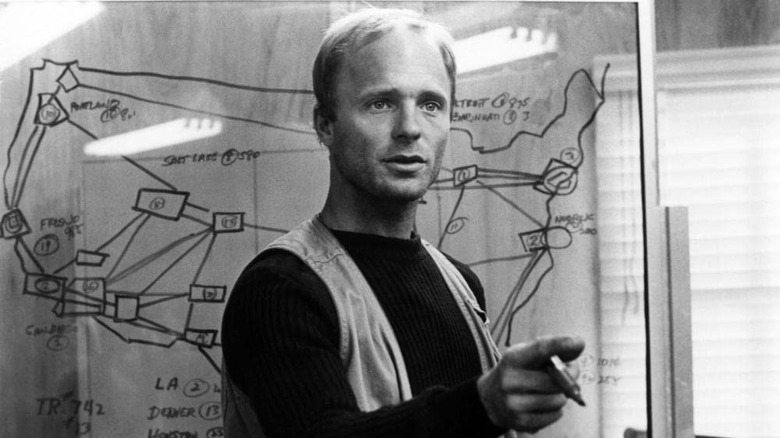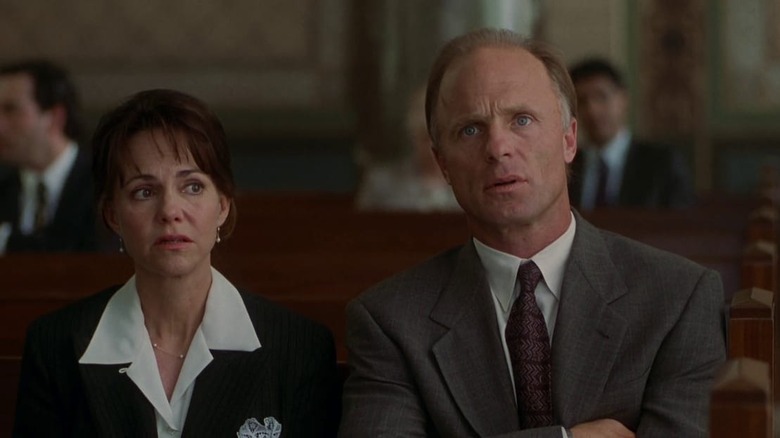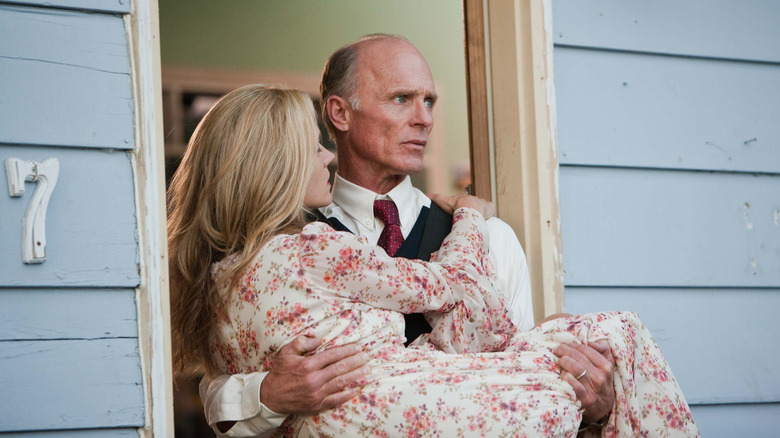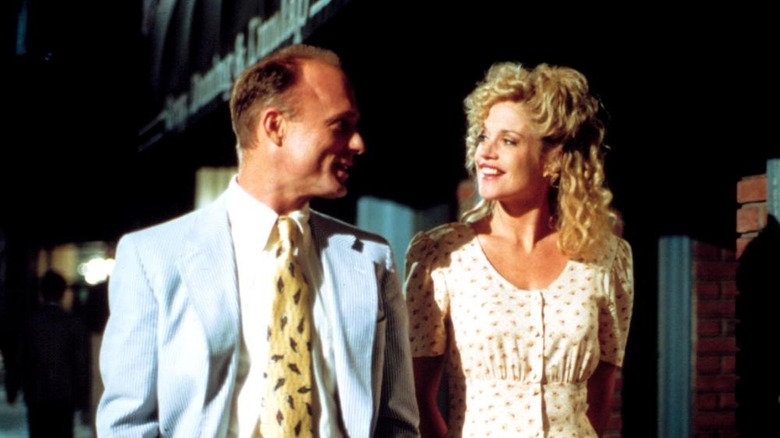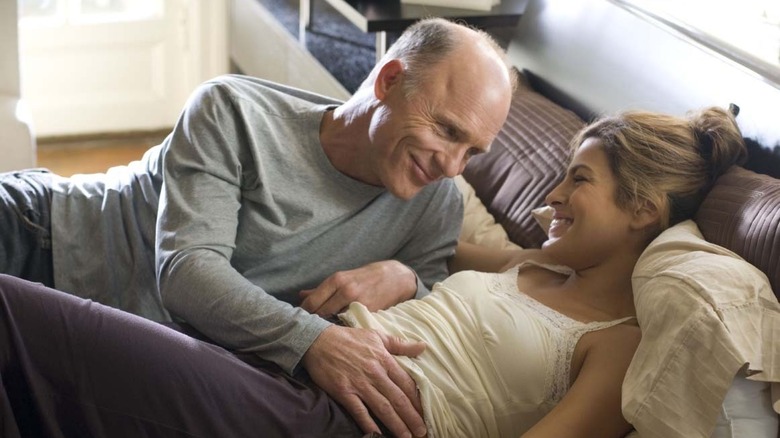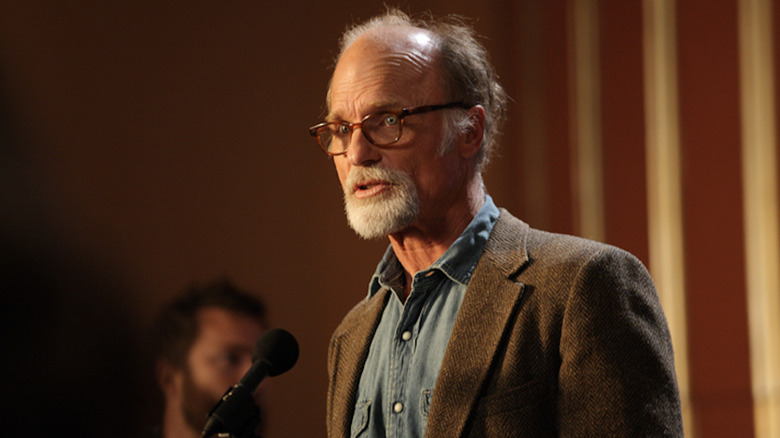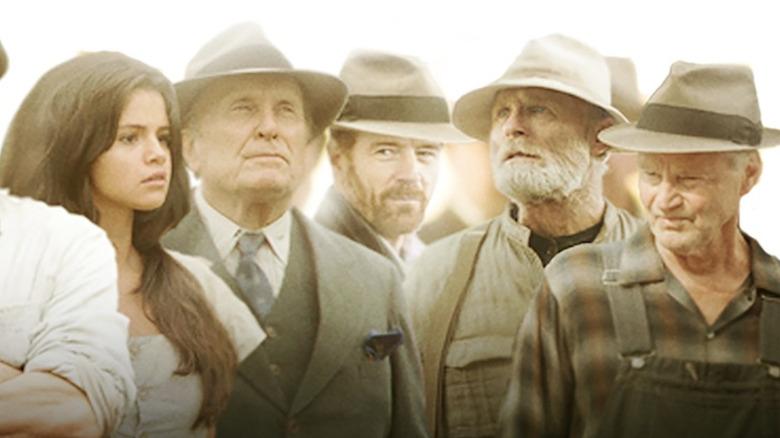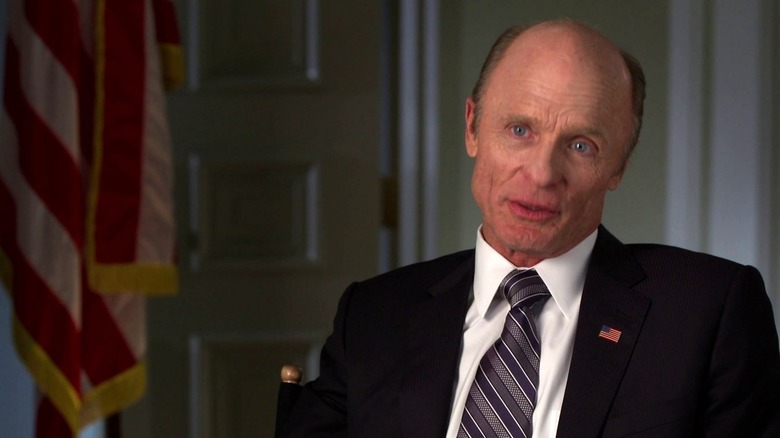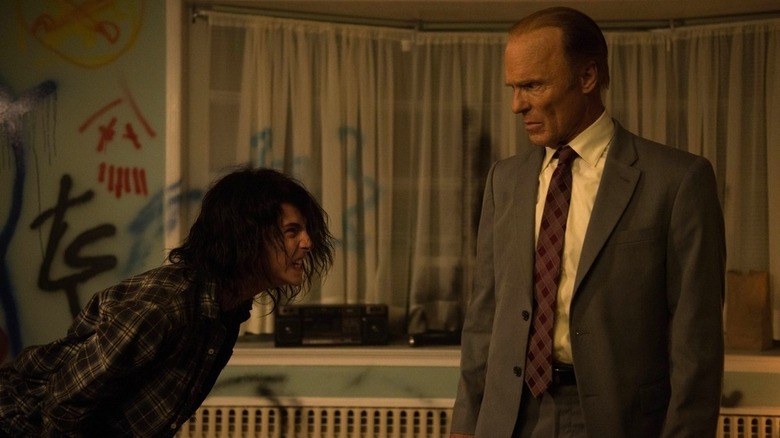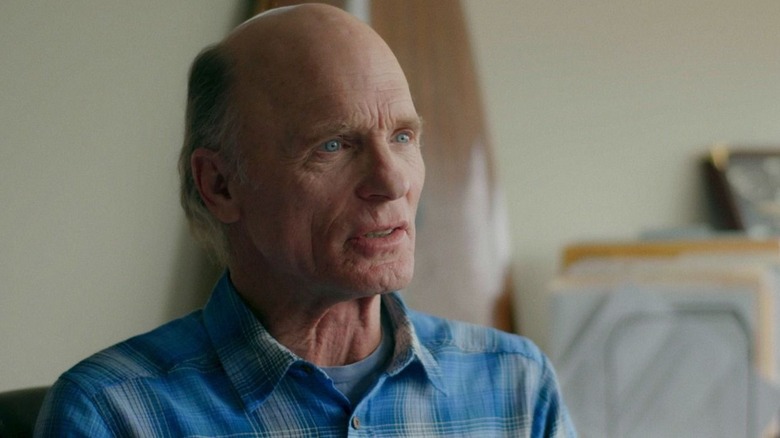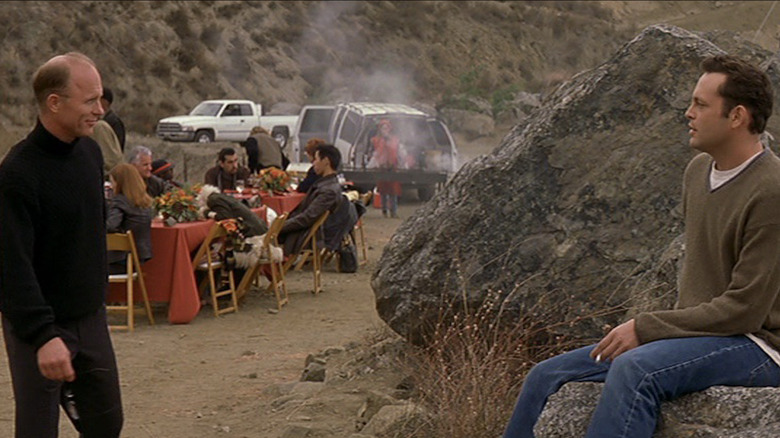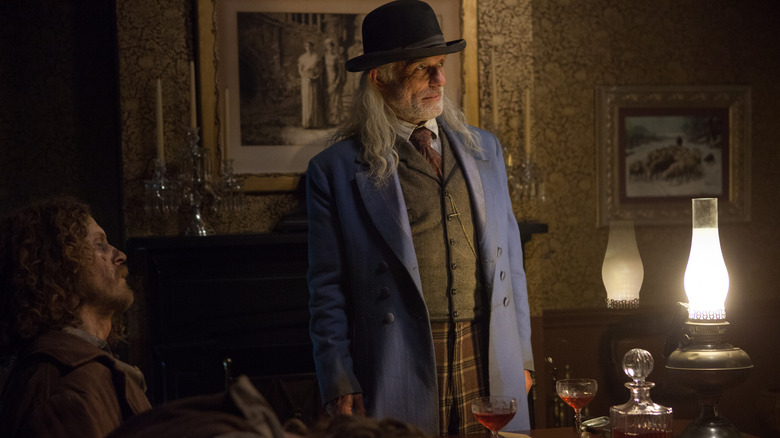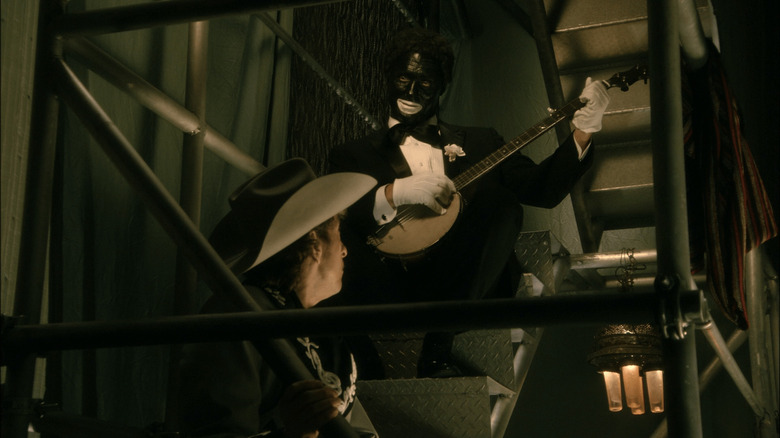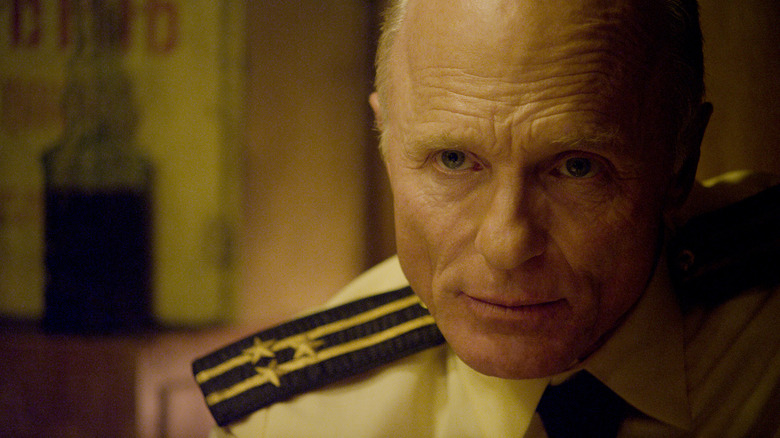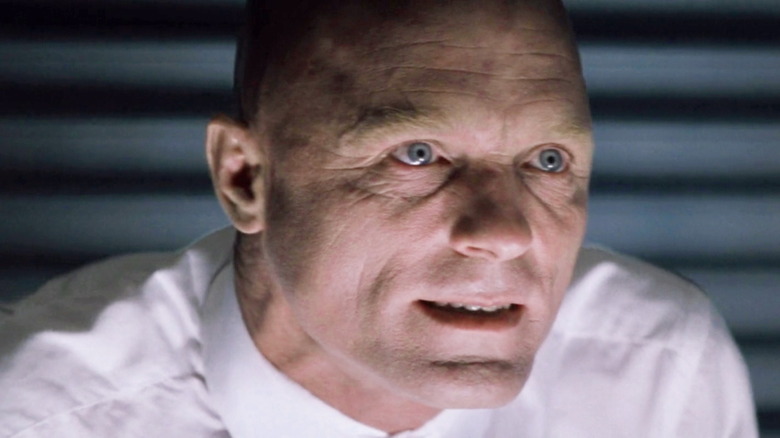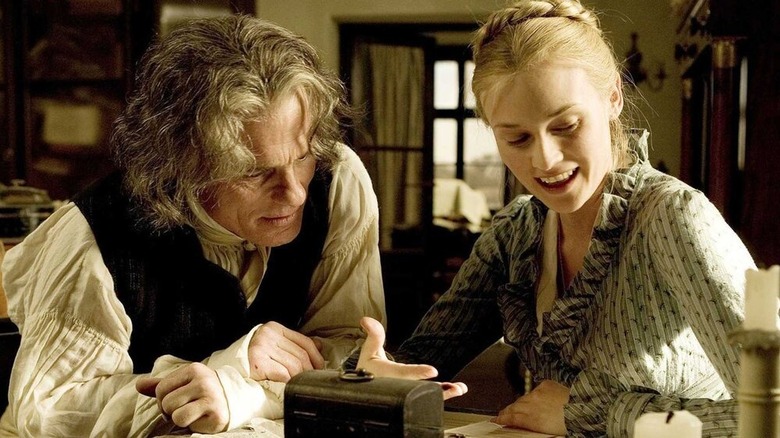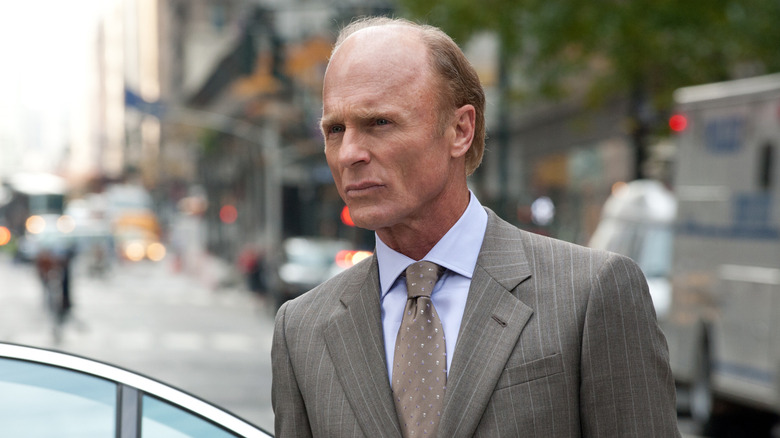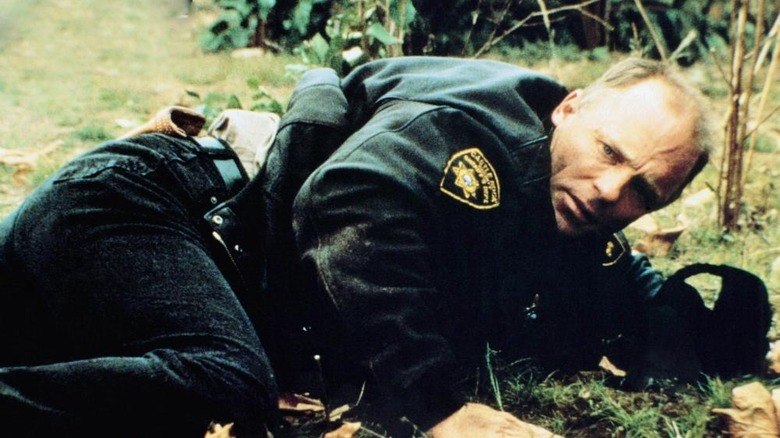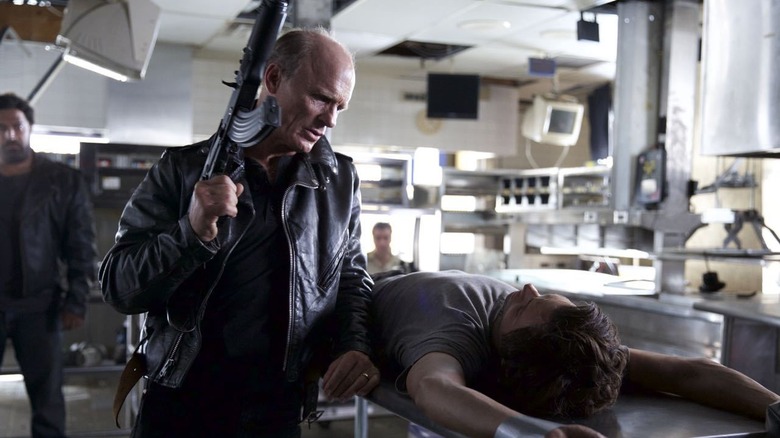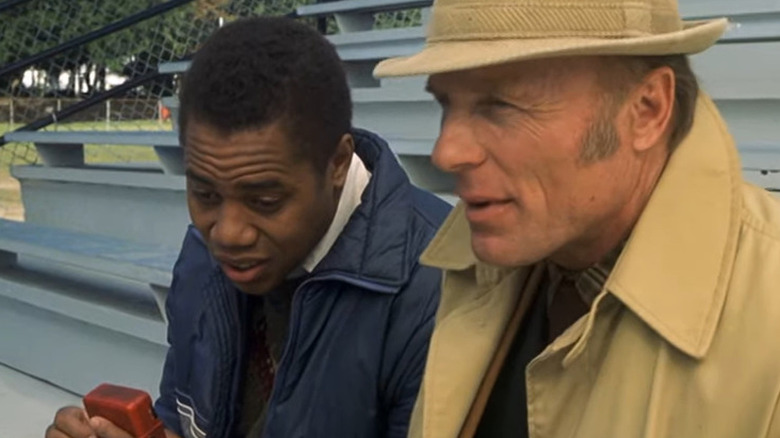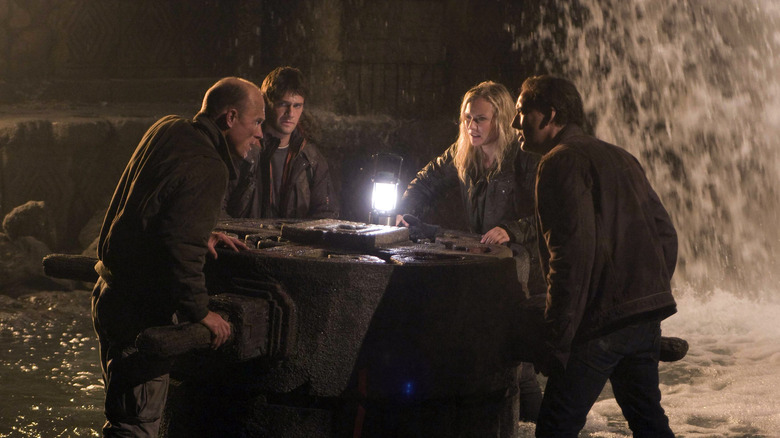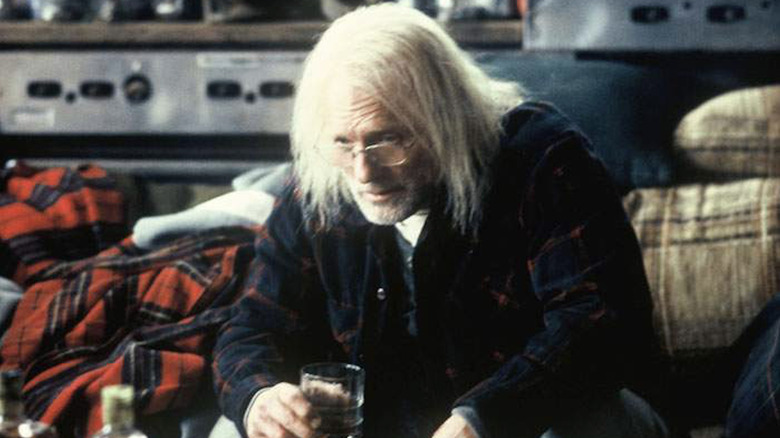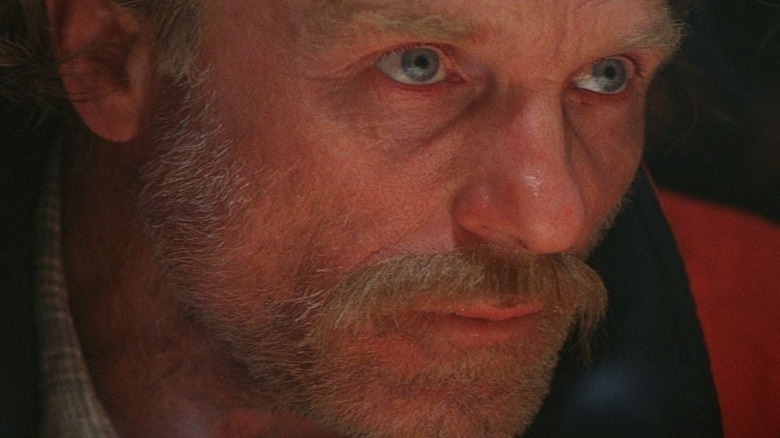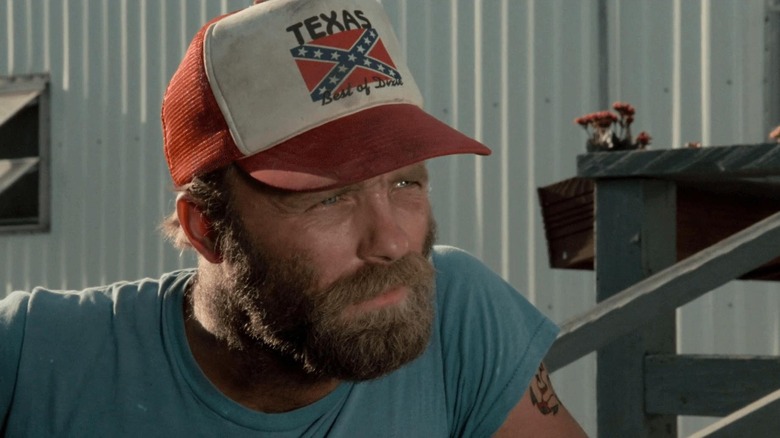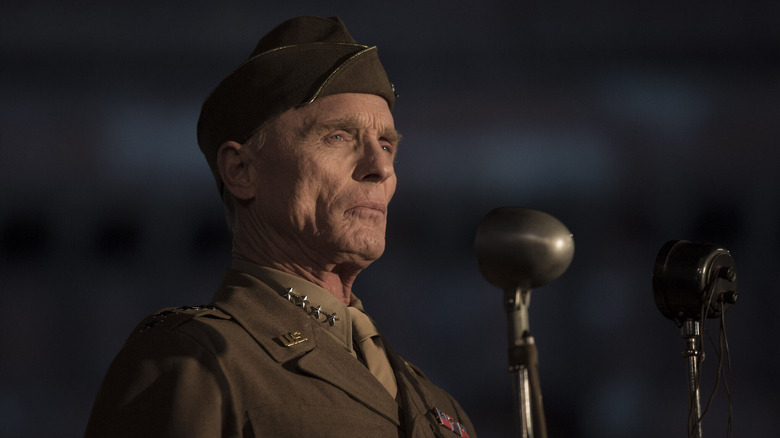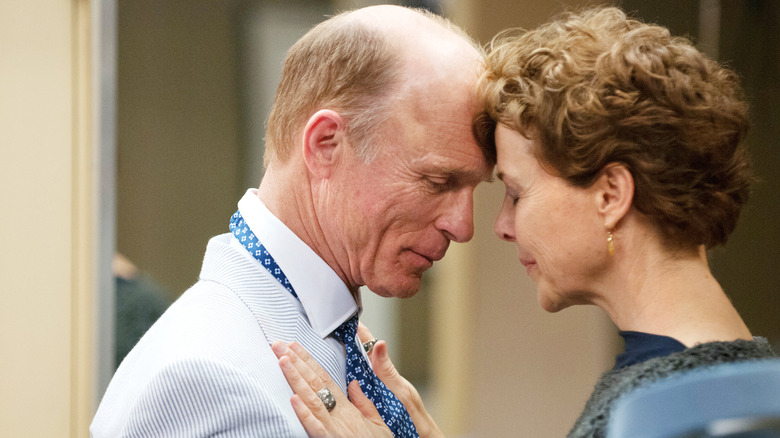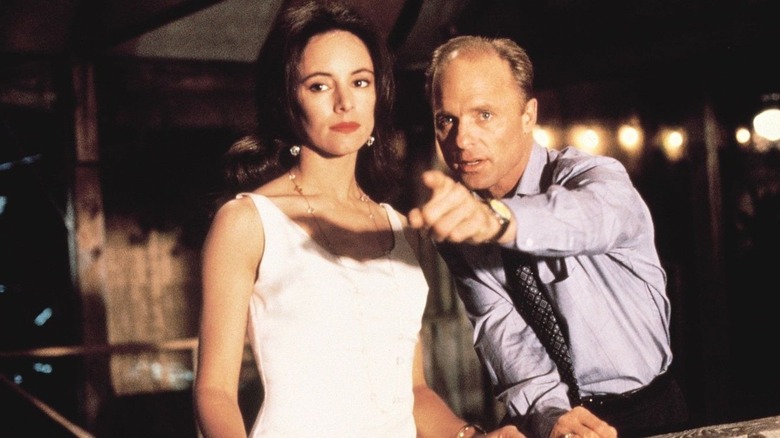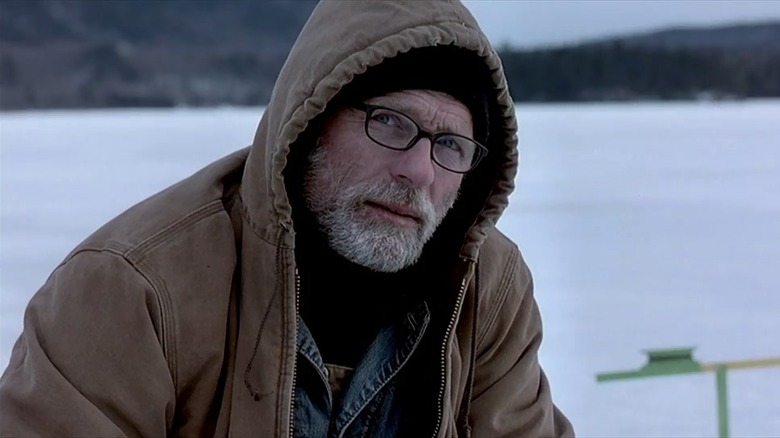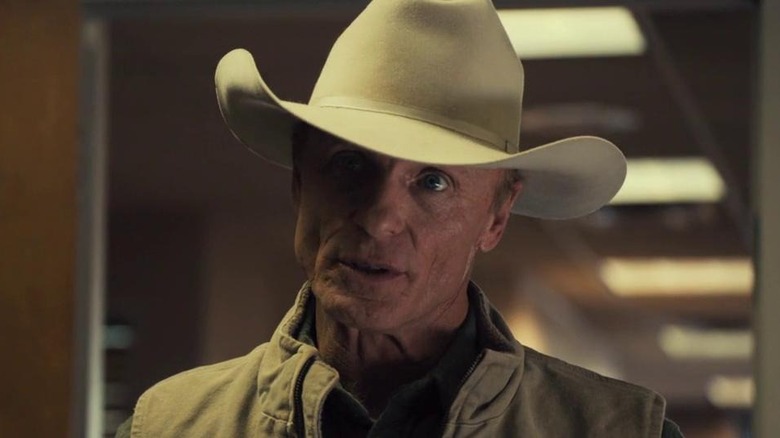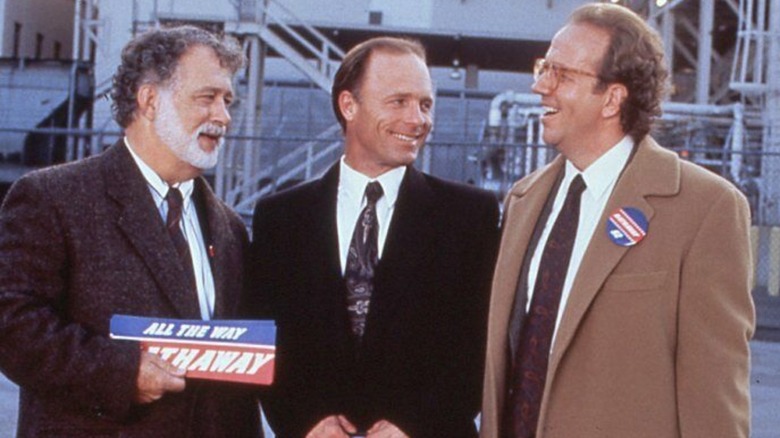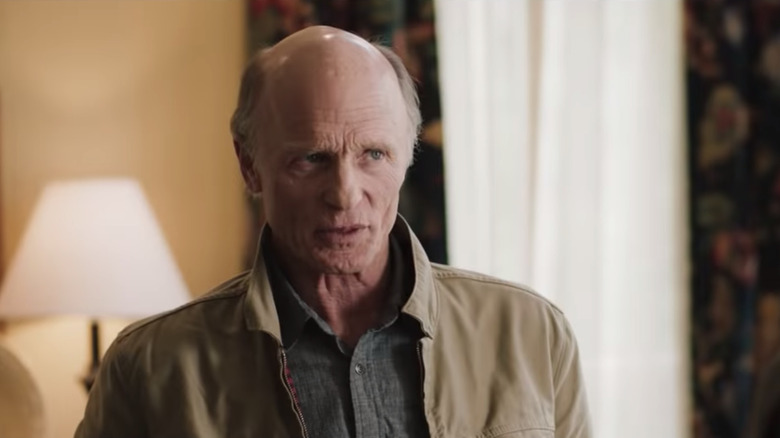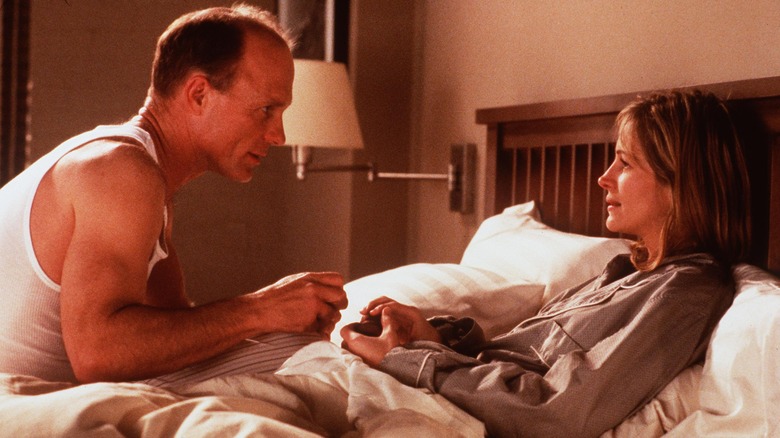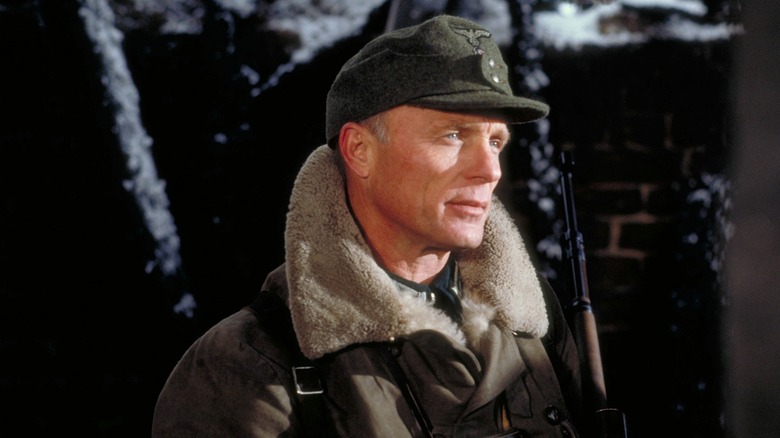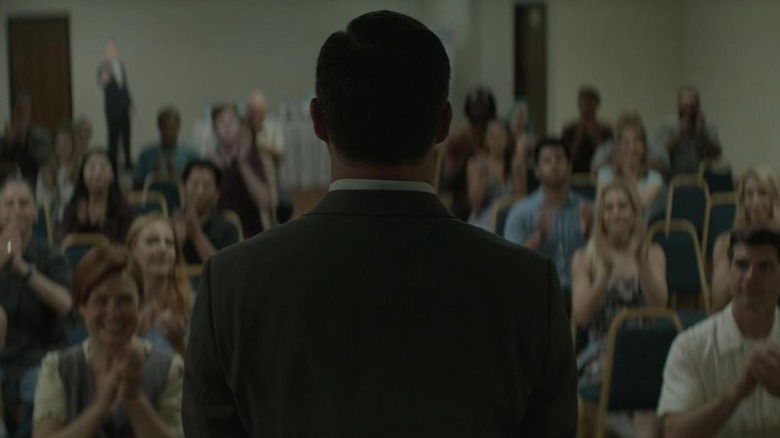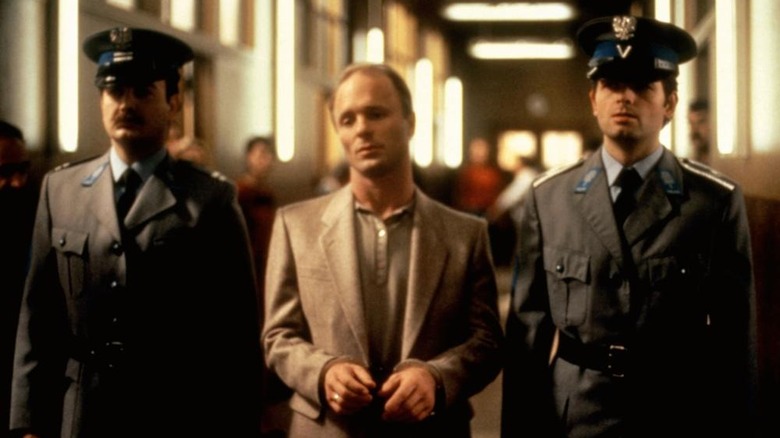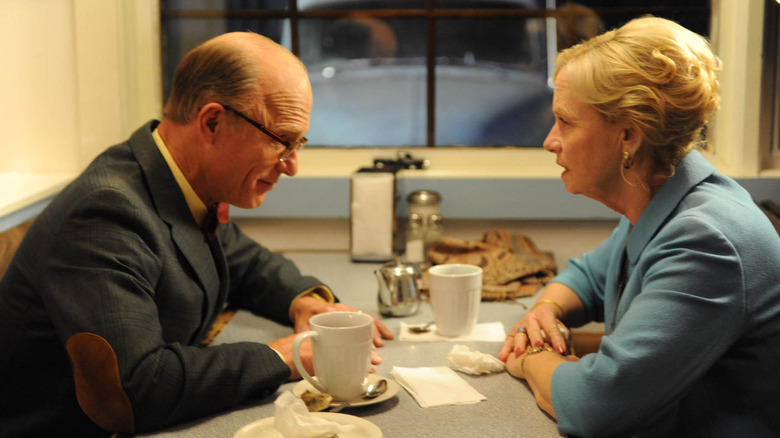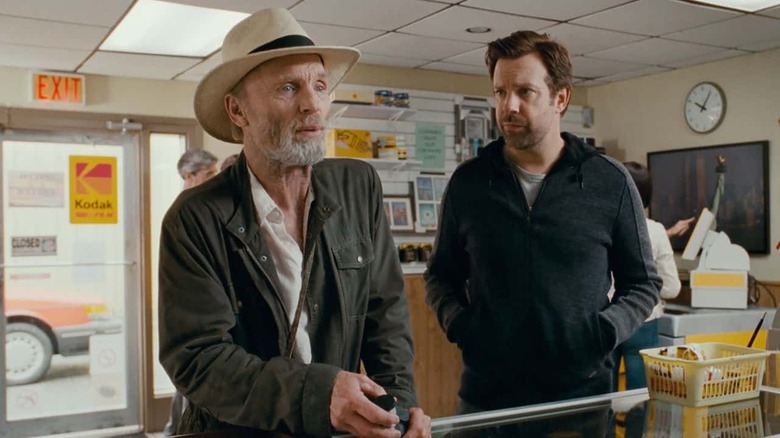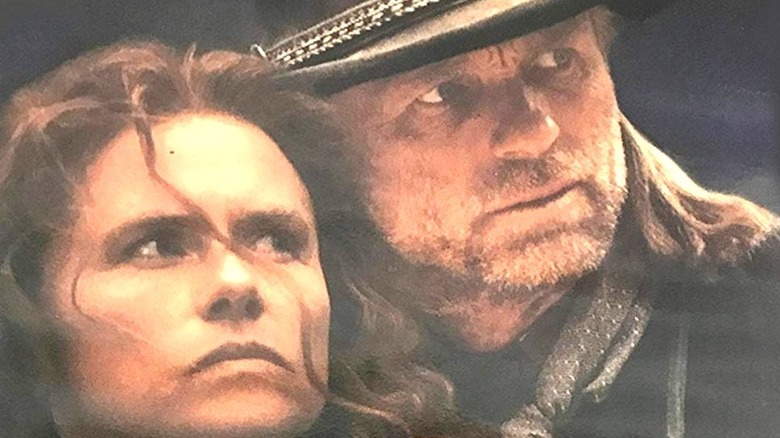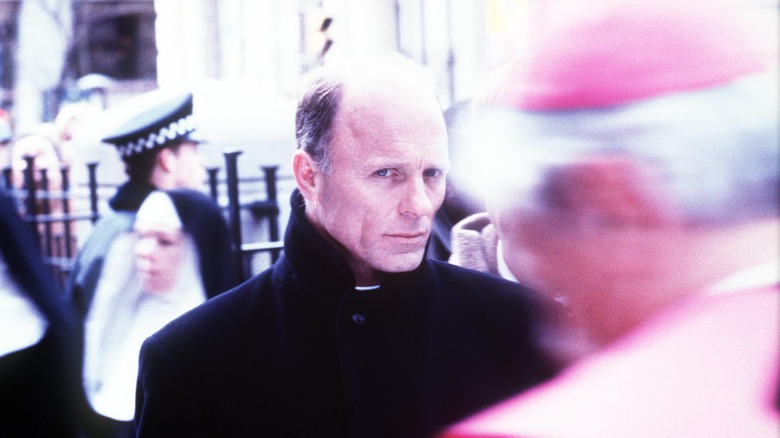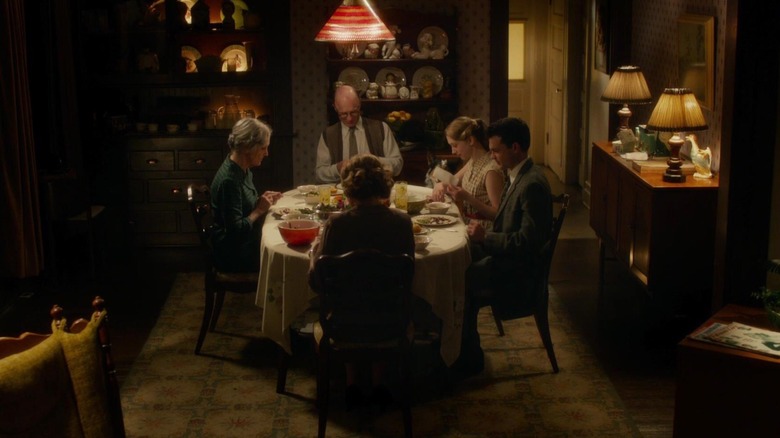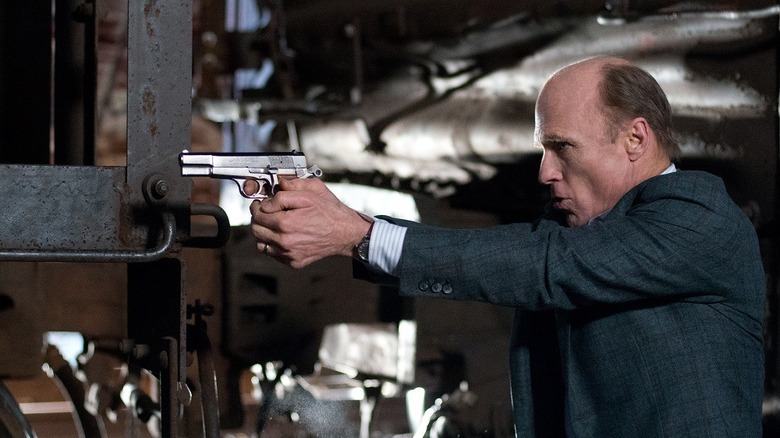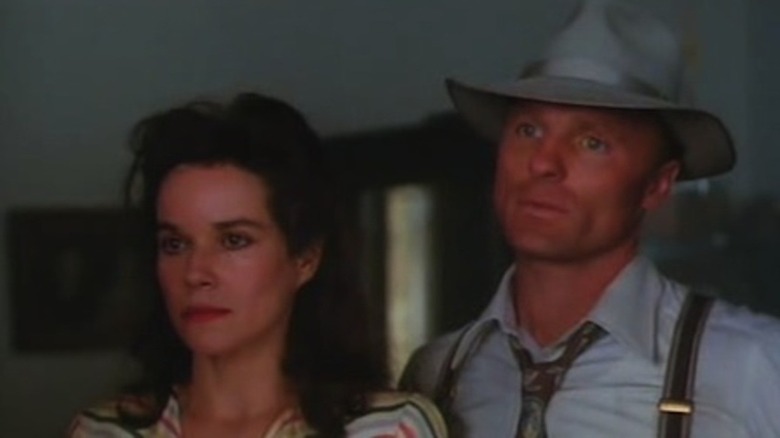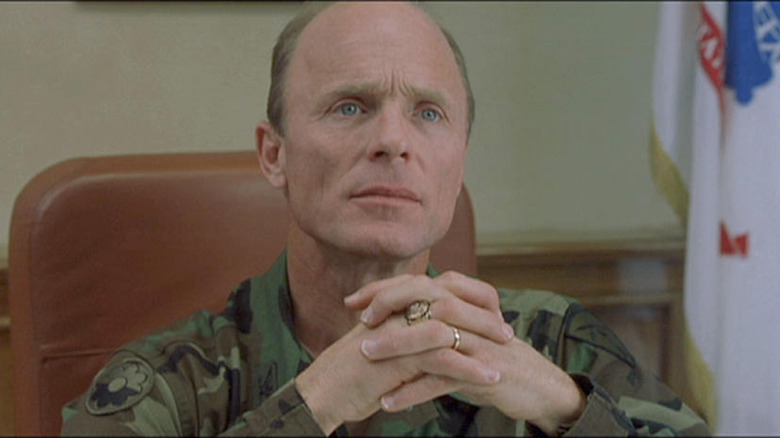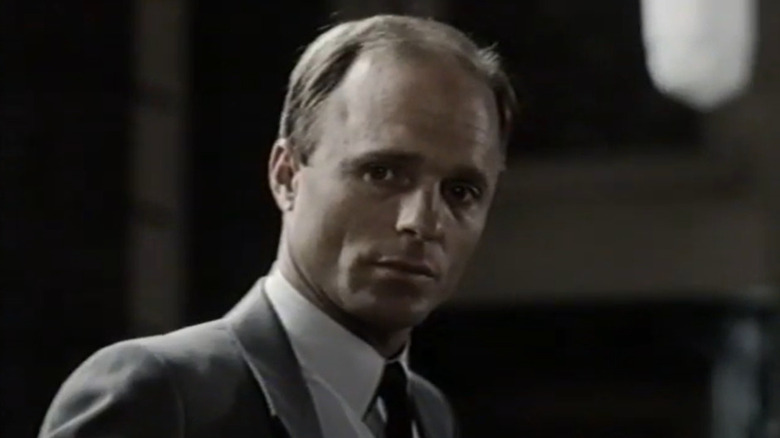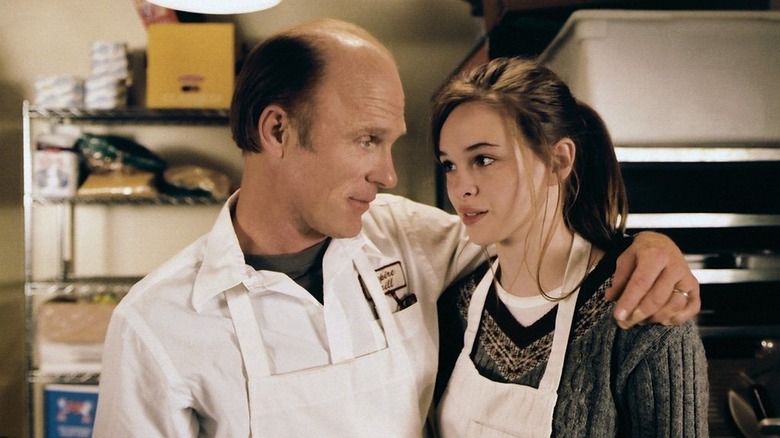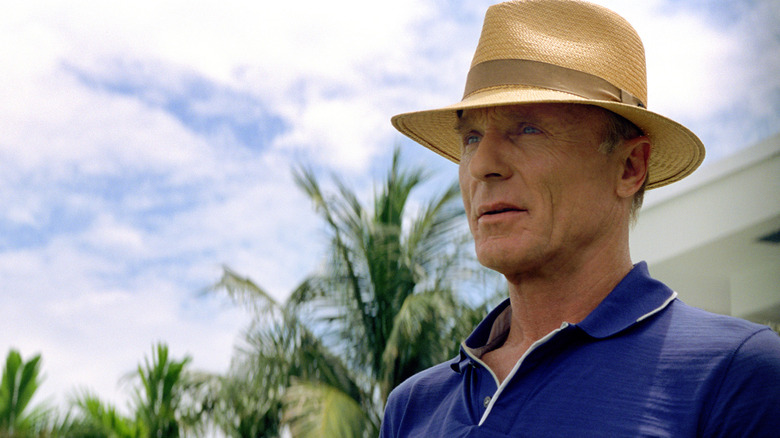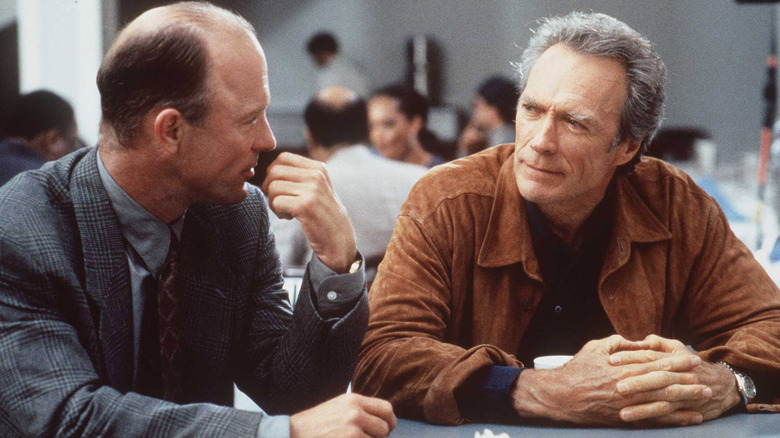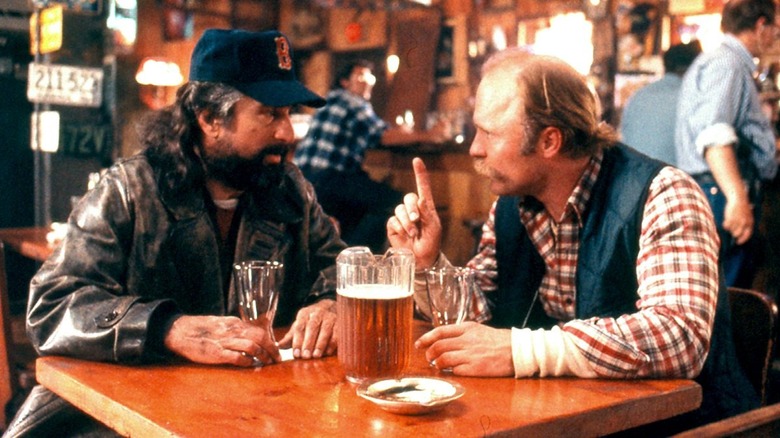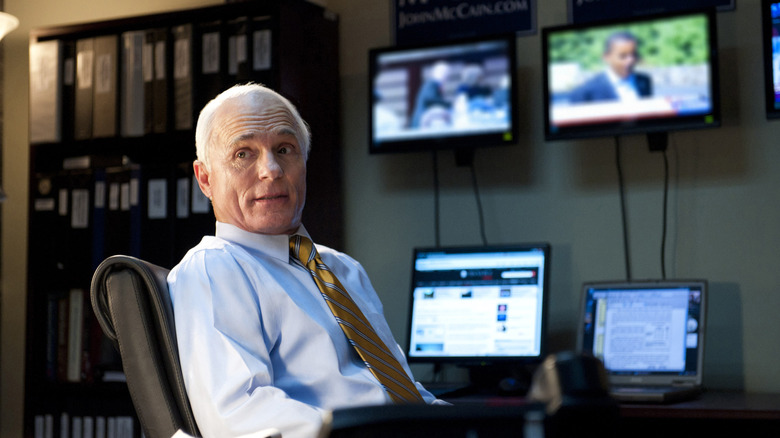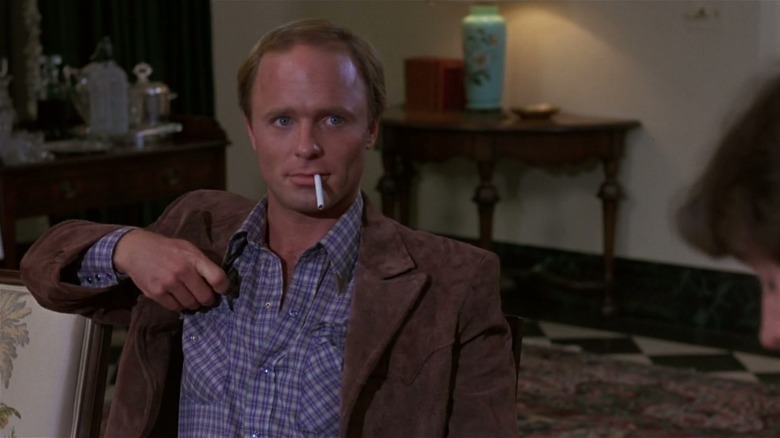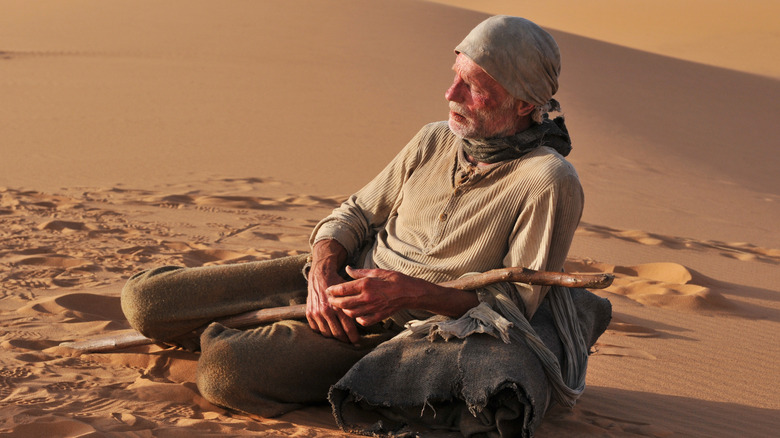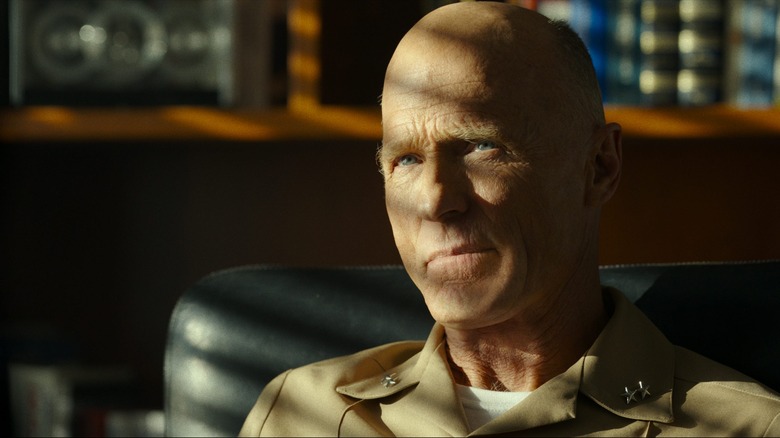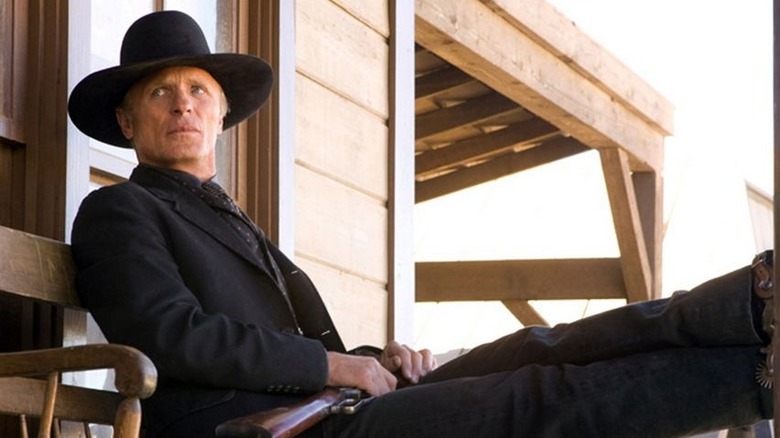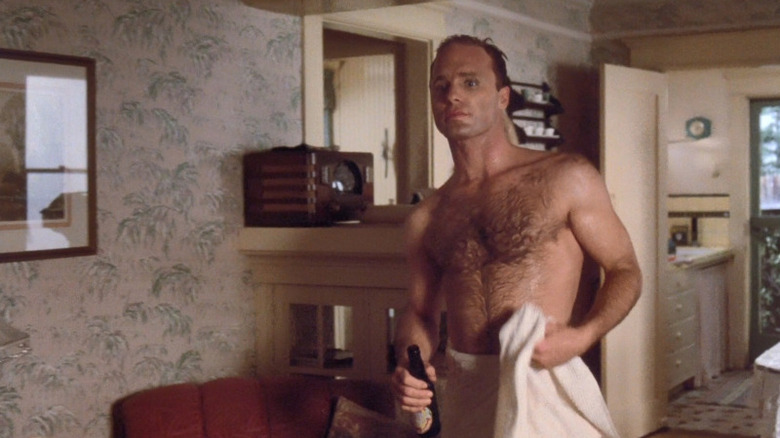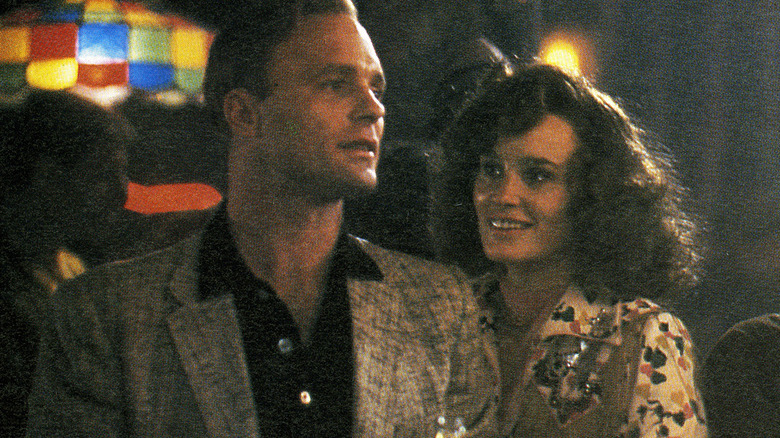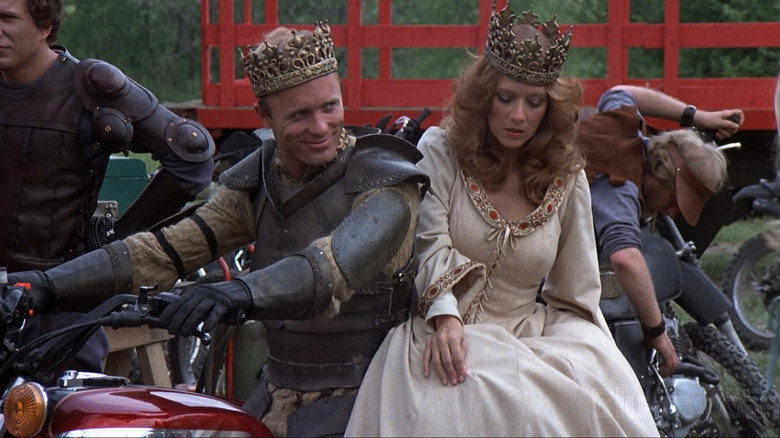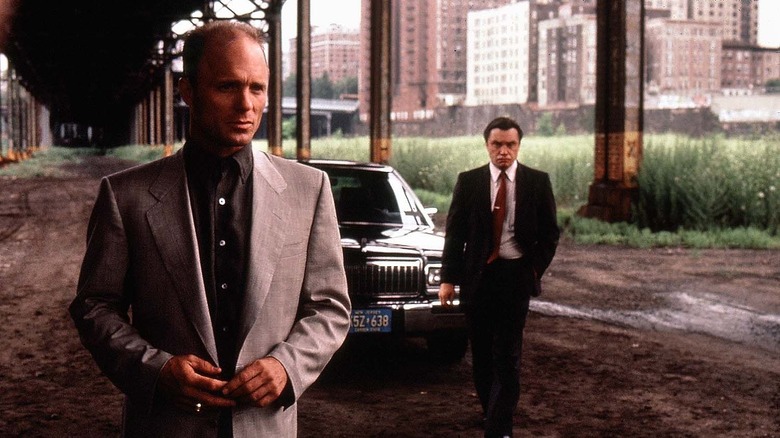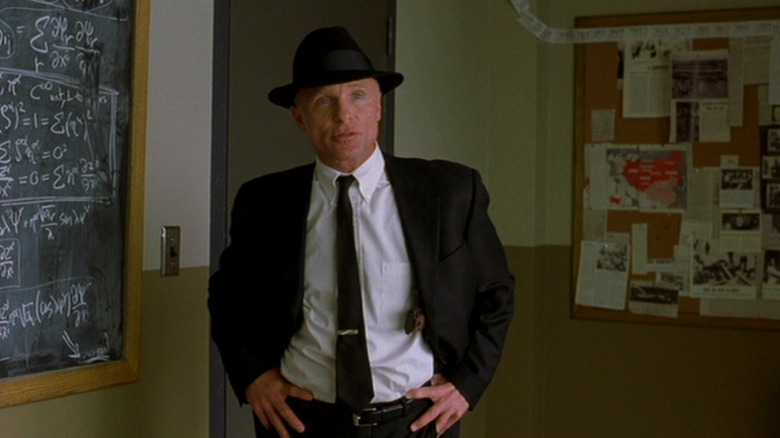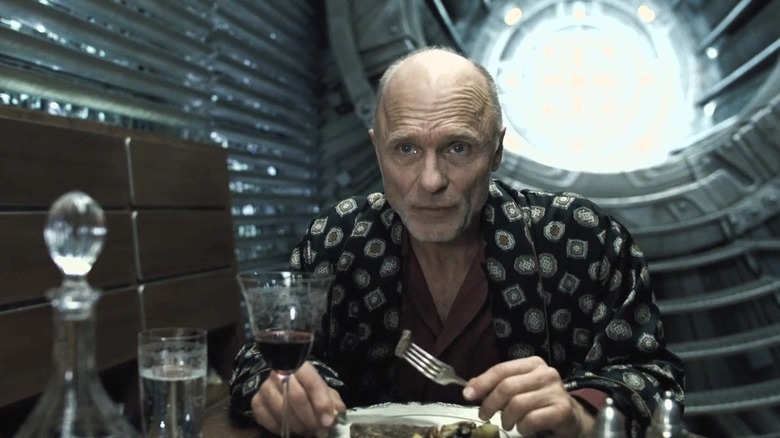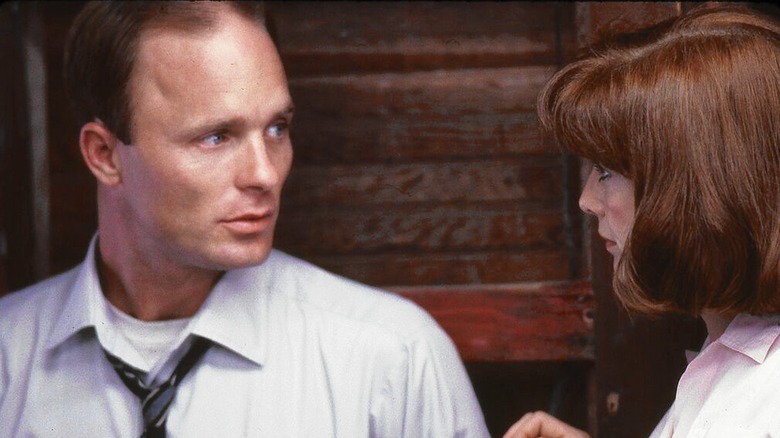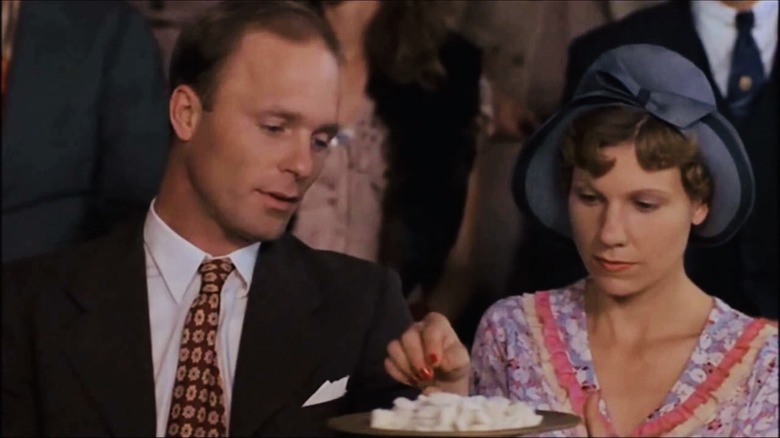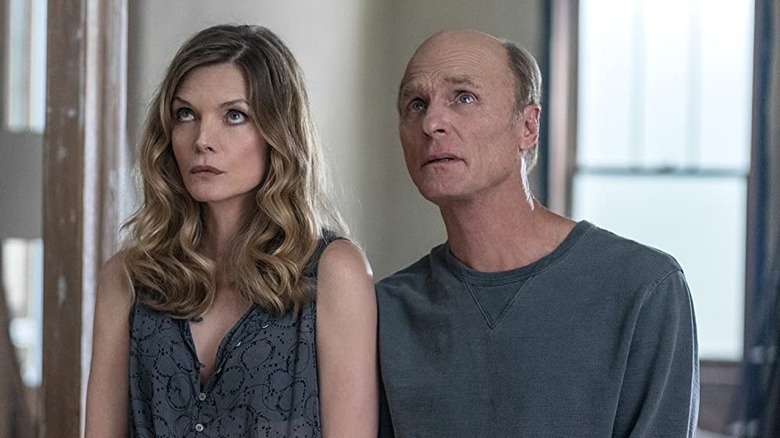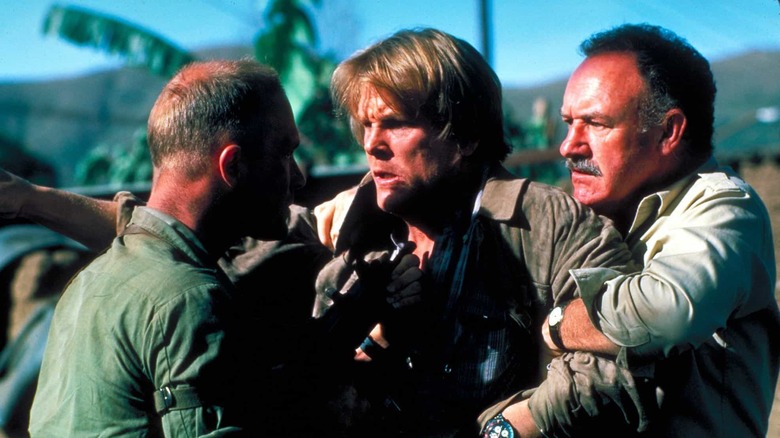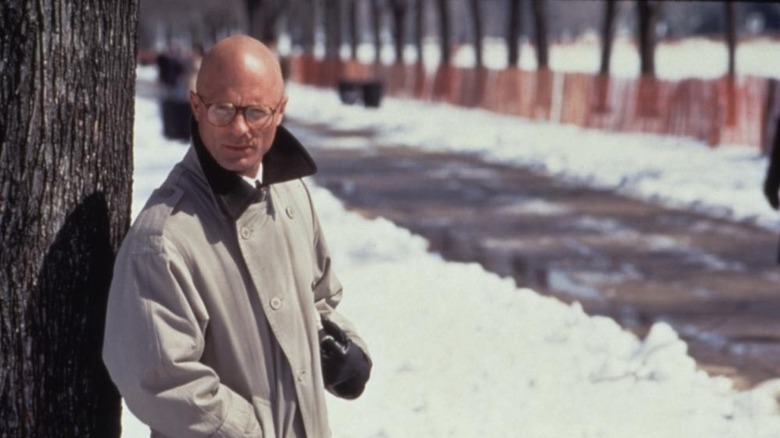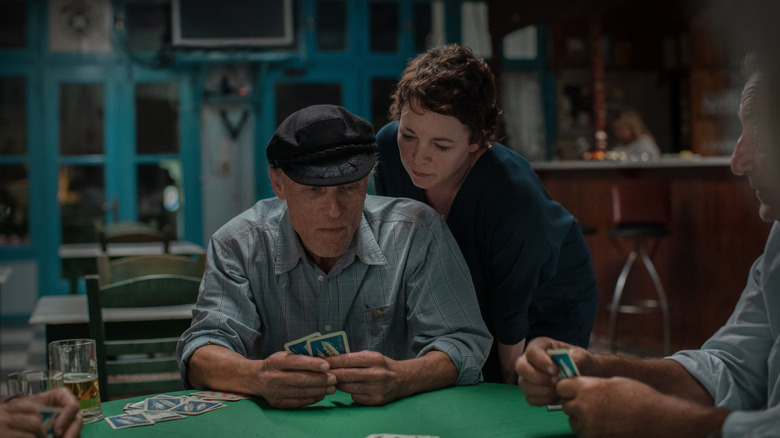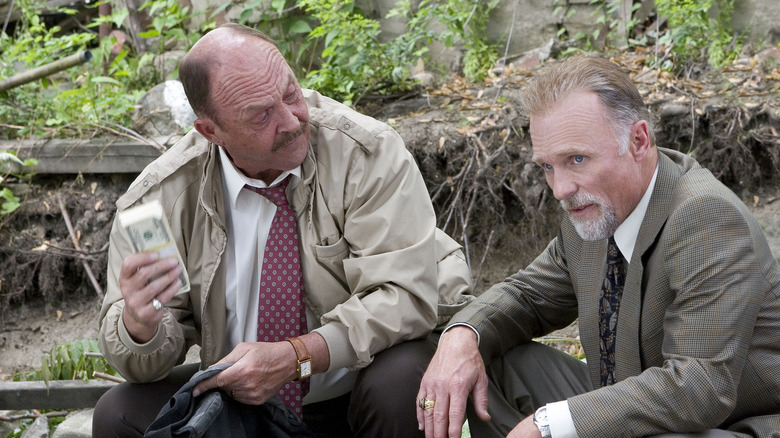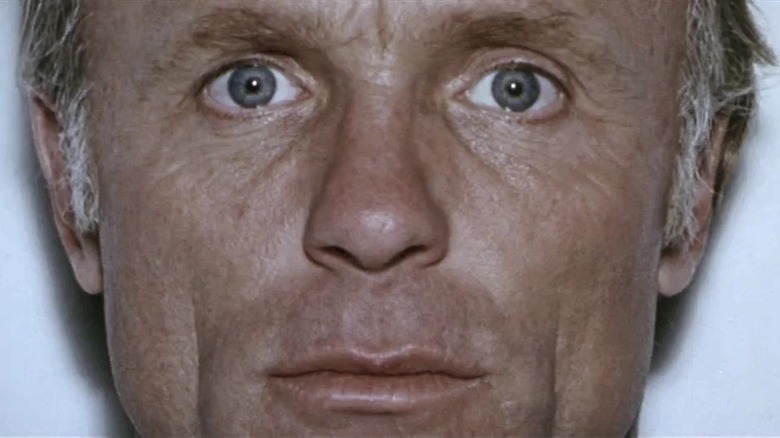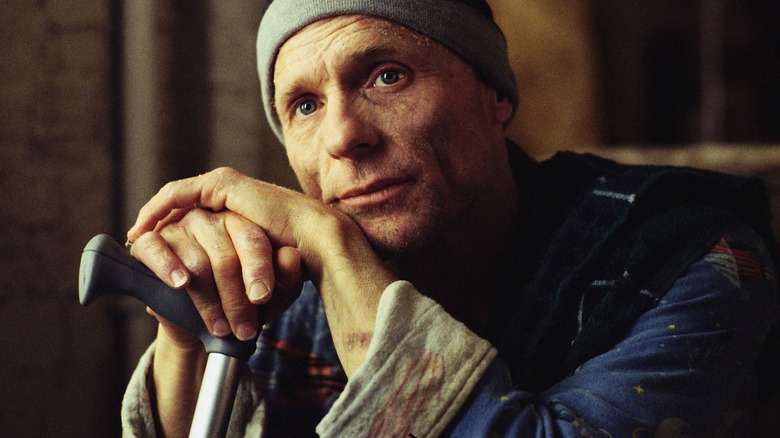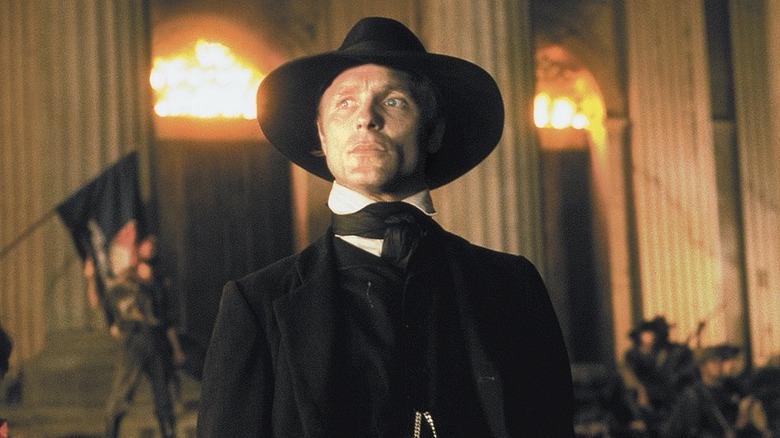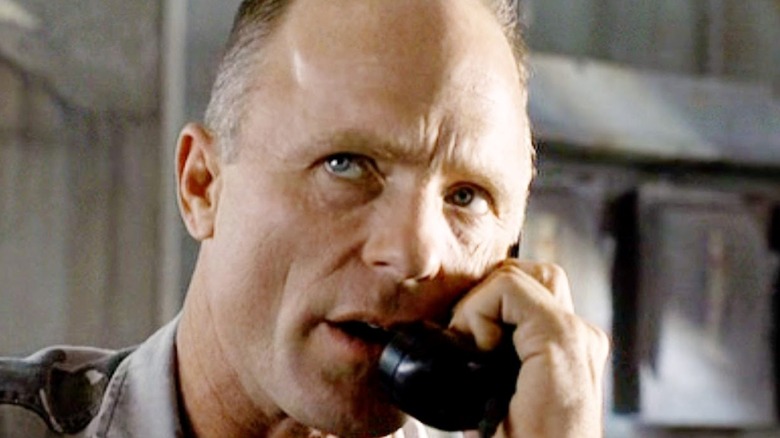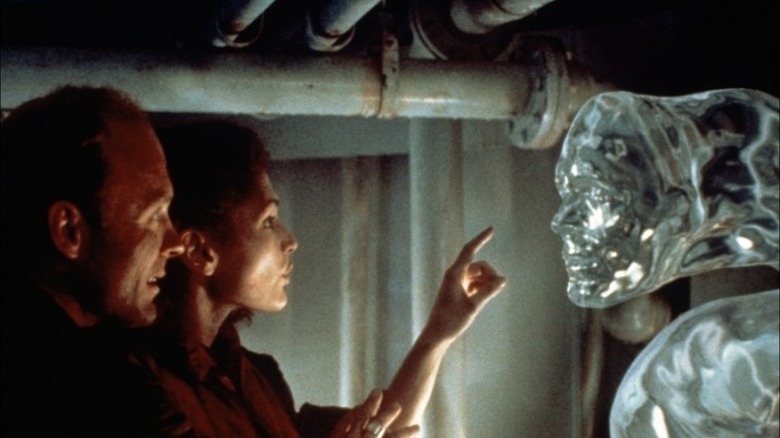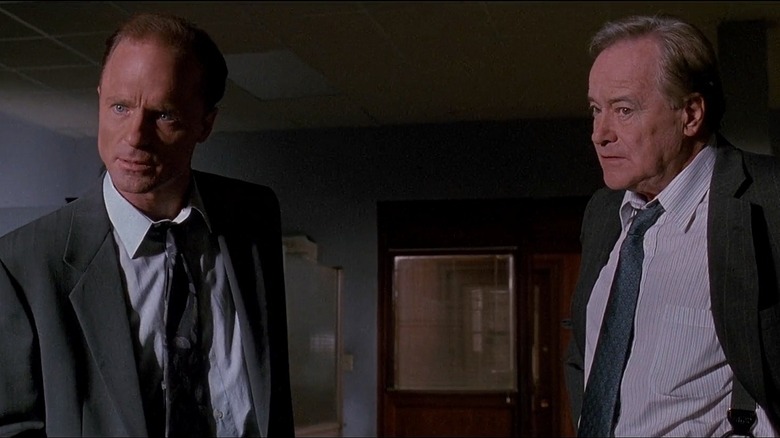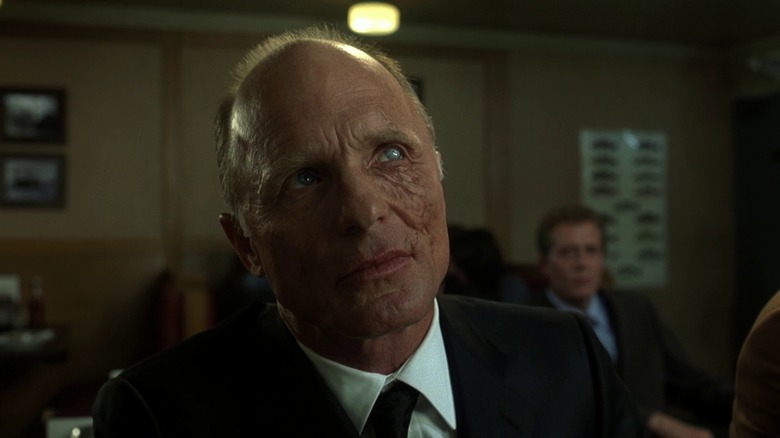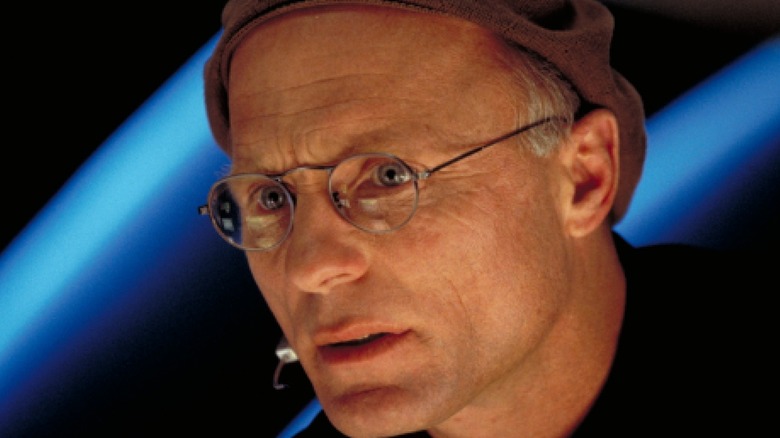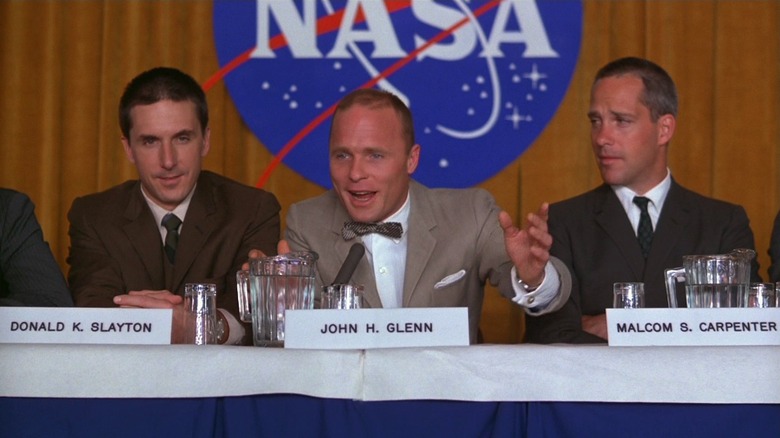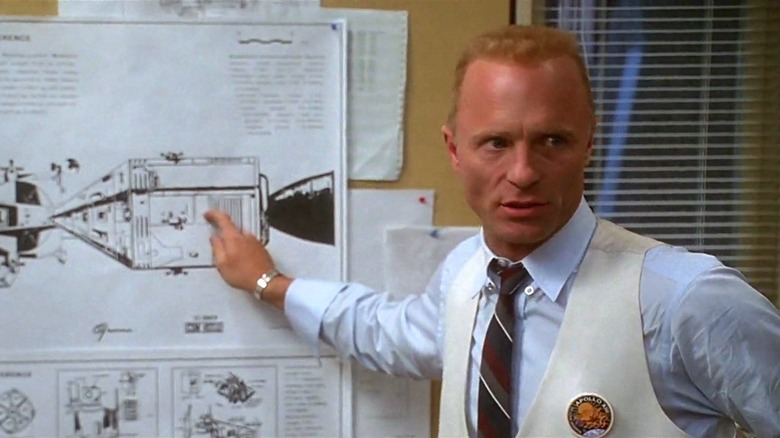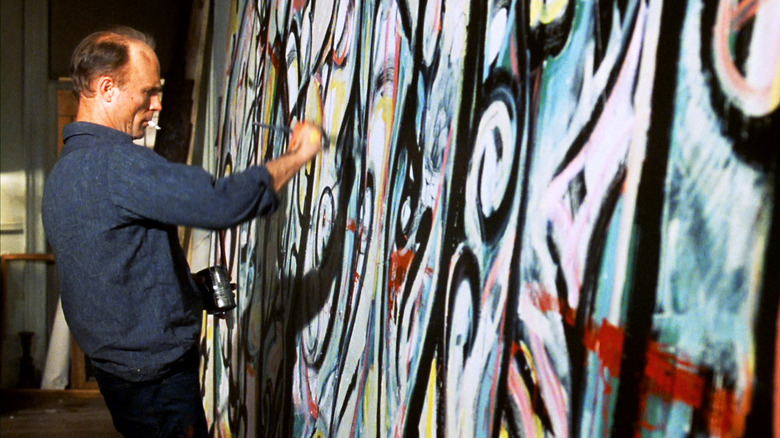Every Ed Harris Movie Ranked Worst To Best
Has there been a more reliable screen presence than Ed Harris? No matter the size of the role, Harris always delivers.
Born in 1950 in New Jersey, Harris decided to pursue acting after playing high school and college football. After appearing in dozens of plays, movies, and TV shows, his breakthrough came in 1983 with his portrayal of John Glenn in "The Right Stuff." Several high-profile film roles followed, including one in "Places in the Heart," where he met his wife and frequent co-star, Amy Madigan.
Throughout his prolific movie career, Harris has earned four Oscar nominations, three in the best supporting actor category ("Apollo 13," "The Truman Show," and "The Hours") and one in best actor ("Pollock"). His role in "The Truman Show" won him the Golden Globe, while his turn in "Apollo 13" brought him two SAG awards (one in best supporting actor, the other in best ensemble). He reaped an additional Globe bid as best supporting actor for "Jacknife," and SAG ensemble nominations for "Nixon," "A Beautiful Mind," and "The Hours," as well as BAFTA bids for "The Truman Show" and "The Hours."
He's also been an awards magnet on the small screen, receiving Emmy nominations for "Westworld," "Empire Falls," and "Game Change," reaping Golden Globe bids for the latter two (and a win for "Game Change"). All three have also earned him SAG nominations, as has the TV movie "Riders of the Purple Sage."
Let's take a look at every Ed Harris movie, ranked from worst to best.
79. Once Fallen (2010)
For a movie starring Ed Harris, Taraji P. Henson, Amy Madigan, and Peter Weller, "Once Fallen" is surprisingly anonymous. The film went straight to video after premiering at a handful of festivals and largely disappeared after that. As such, you'd be hard-pressed to find any reviews from critics or audiences, who perhaps didn't realize it existed. Even if it isn't Harris' worst movie, it's certainly his least memorable, placing it firmly at the bottom of this list.
Written and directed by Ash Adams (who also has a small role in the film), it stars Brian Presley as Chance Ryan, an ex-con who's trying to turn his life around after a stint in prison. His father, Liam (Harris), is serving a life sentence for murder at the same jail his son was just released from, and he has become the leader of the jail's chapter of the Aryan Brotherhood. Upon release, Chance learns from his ex-girlfriend that he has a son, August (Keegan Thomas), falls in love with his ex's friend, Pearl (Henson), and struggles to reconnect with his mother, Rose (played by Harris' real-life wife, Amy Madigan). His quest for redemption is nearly derailed when he agrees to help a friend repay a debt to a violent mobster named Eddie (Weller).
78. Code Name: Emerald (1985)
Remember "Code Name: Emerald"? Much less, ever heard of it? If the answer is "no," you're not the only one. Directed by Jonathan Sanger, it's a WWII drama about the efforts of American agent Gus Lang (Ed Harris) to prevent the Nazis from finding out the date and location of the D-Day invasion. To do this, he goes deep undercover to rescue a captured overlord, Lieutenant Andy Wheeler (Eric Stoltz), who has intimate knowledge of the upcoming attack. Lang must impersonate a Nazi to infiltrate the prison, giving Harris the opportunity to try out his best German accent, which fools officers Jurgen Brausch (Max von Sydow), Walter Hoffman (Horst Buchholz), and Ernst Ritter (Helmut Berger).
"Code Name: Emerald" wasn't screened for critics before its release, so there aren't many reviews save for one from TV Guide, which wrote, "Unfortunately, this fairly routine spy drama has almost no action." That's bad news for an espionage thriller that boasts an all-star cast, and it's likely why the film all but completely disappeared after it was released.
77. Borderline (1980)
Everybody has to start somewhere, and Ed Harris began his leading man career with a role in one of Charles Bronson's worst films. (Technically speaking, this was Harris' second movie role, his first being a small part as a pathology resident in 1978's "Coma"). "Borderline" stars Bronson as Jeb Maynard, a Border Patrol officer who's trying to track down a killer who murdered his best friend, fellow USBP officer "Scooter" Jackson (Wilford Brimley), and a young Mexican boy. He soon learns this is the work of Hotchkiss (Harris), aka "the Marine," an illegal alien smuggler working for local rancher Carl Richards (Bert Remsen). Maynard decides to go deep undercover, posing as a Mexican immigrant in order to catch his man.
Writing for The New York Times, Tom Buckley said "Borderline" has, "an air of cheapness and improvisation. The characterization and dialogue are rudimentary, as is the direction by Jerrold Freedman." The TV Guide writeup concurred, saying it was, "a good programmer, but nothing special." (True to their name, they also complained that the darkly-filmed night footage would "make this a tough film to watch on TV in a semi-lit room, but it plays well enough in a theater.") But hey, if nothing else, at least it did the trick of introducing the world to the talents of Ed Harris, who would spend the rest of the 1980s rising to greater and greater heights.
76. Eye for an Eye (1996)
Pretty much everyone involved in "Eye for an Eye" is scraping the bottom of the barrel, from actors Sally Field and Ed Harris to Oscar-winning director John Schlesinger. It's the kind of tawdry revenge flick you'd expect to star Charles Bronson or Liam Neeson, not Forrest Gump's sweet, folksy momma. But the gender swap aside, there's not much else to differentiate it from any number of C-level action cheapies.
Field plays Karen McCann, a happily-married suburbanite who is forced to listen to her teenage daughter, Julie (Olivia Burnett), get violently raped and murdered over the phone. When the killer, Robert Doob (Kiefer Sutherland), gets let off on a legal technicality, he starts deliberately stalking Karen and her younger daughter, Megan (Alexandra Kyle). Despite the best efforts of her husband, Mack (Harris), and kindly police detective Denillo (Joe Mantegna), Karen becomes obsessed with enacting her own form of vengeance.
Critics savaged "Eye for an Eye," ripping it for its tacky approach to touchy subject matter (especially coming around the same time as "Dead Man Walking," a film that approached murder and capital punishment in a far more humane way). "Never in his varied career has Mr. Schlesinger made a film as mean-spirited and empty as this," said Janet Maslin of The New York Times. Roger Ebert concurred, calling it, "a particularly nasty little example of audience manipulation leading to a conclusion that, had I accepted it, would have left me feeling unclean."
75. Virginia (2010)
Dustin Lance Black attracted an A-list cast for "Virginia," but even the talents of Ed Harris, Jennifer Connelly, and Emma Roberts couldn't keep this one from receiving a rotten reception from critics. The reaction at the 2010 Toronto Film Festival was so bad that Black drastically recut the film before finally releasing it two years later.
The semi-autobiographical story stars Connelly as Virginia, a schizophrenic Southern belle who carries on a decades-long affair with married sheriff Richard Tipton (Harris). Their relationship is further complicated when Virginia's son, Emmett (Harrison Gilbertson), falls in love with Tipon's daughter, Jessie (Roberts). There's also the issue of Virginia's recent cancer diagnosis, which she decides to turn into a fake pregnancy so she can blackmail her lover for financial support while he's running for state senate. Harris' wife, Amy Madigan, costars as his onscreen spouse, Roseanna, who suspects something's going on.
Although Connelly won praise for her performance, the rest of the film was largely dismissed by reviewers, even after the extensive recuts. "Ms. Connelly gives a brave, full-tilt performance that is true to the character but can't hold the movie together," opined Stephen Holden of The New York Times. Peter Debruge of Variety called it, "a scattershot Southern melodrama that can't decide what it wants to be," adding it was "sustained only by Jennifer Connelly's empathetic perf[ormance]." Those bad reviews did nothing to help its chance at the box office, where it grossed a paltry $12K.
74. Milk Money (1994)
The subject matter of "Milk Money" is pretty icky by today's standards, but even in 1994 its reception was... well... curdled. Directed by Richard Benjamin, it centers on a group of young boys — headed by Frank Wheeler (Michael Patrick Carter) — who pool their money and hire a prostitute named V (Melanie Griffith) to strip for them. After obliging them, she reveals she's being pursued by a vicious mobster named Waltzer (Malcolm McDowell), and she asks to hide out in Frank's house. Before long, Frank's single father, Tom (Ed Harris), has fallen in love with his new houseguest, blissfully unaware of her what her actual occupation is.
Most of the negative reactions centered on John Mattson's screenplay, which earned a Razzie nomination. Variety said the premise "could curdle your stomach, and the execution of the idea is just plain rancid." Jonathan Rosenbaum of The Chicago Reader agreed, complaining that the script, "dawdles, stumbles, stalls, embarrasses both itself and the audience, and is routinely formulaic to boot." Although her review was just as scathing, Janet Maslin of The New York Times did praise Harris' performance as "improbably charming, despite the fact that his character, an amateur ecologist, is presented as one of the dimmest creatures ever to crawl out of the tide pool." Even Harris can outshine the worst ideas.
The film failed to register with audiences as well, who could smell a stinker based on those reviews, and it ultimately took in only $18 million at the box office.
73. Cleaner (2007)
When director Renny Harlin hits, you get glorious action spectacles like "Die Hard 2," "The Long Kiss Goodnight," and "Deep Blue Sea." But when he misses, you get stuff like "Cleaner." Samuel L. Jackson plays Tom Cutler, a retired police officer who now supports his daughter (a young Keke Palmer) by working as a crime scene cleaner. After performing a routine job at a sprawling mansion, Cutler gets contacted by a homeowner, Ann Norcut (Eva Mendes), who wants to know why he was in her house. It soon becomes clear Cutler was unwittingly hired to do a coverup, and Norcut's husband — a whistle-blowing police officer — has disappeared. He looks to his former partner, Detective Eddie Lorenzo (Ed Harris), for help, but he's involved in the corruption as well (and has other motives for getting rid of the missing officer).
"Cleaner" went straight to DVD after its disastrous debut at the Toronto Film Festival, where critical reception resembled something close to a murder scene. Variety wrote that the film "suffers from a distracting case of visual jitters and takes a 'CSI' approach to fetishizing the messy nature of the human body." Nathan Rabin of The AV Club concurred, saying, "Low energy and grindingly mediocre, it adds a whole new dimension to Harlan's wildly uneven oeuvre: tedium." The film did get a good review from Michael Rechtshaffen of The Hollywood Reporter, who called it, "a neatly contained crime whodunnit with a nifty setup and an expert lead performance by Samuel L. Jackson."
72. Salvation Boulevard (2011)
Ed Harris isn't in much of "Salvation Boulevard," which was a blessing in disguise. He plays Dr. Peter Blaylock, an avowed atheist who wants to collaborate on a book with evangelical preacher Dan Day (Pierce Brosnan). But during a discussion at the minister's house, Day accidentally shoots Blaylock in the head with an antique pistol. Although he tries to make it look like a suicide, born-again Christian and ex-Deadhead Carl Vandermeer (Greg Kinnear), witnesses the act, and before long is being pursued by Pastor Dan's rabid congregation. The cast also includes Jennifer Connelly as Carl's devoted wife, Gwen, and Marisa Tomei as his pot-smoking, fellow former Deadhead, Honey Foster.
The film was barely released in theaters before hitting video-on-demand and DVD. That's understandable, considering how rancid its critical reception was. "The exceptional cast does what it can to keep things jumping and grounded, as the tone wobbles from intrigue to farce to back," wrote A.O. Scott of The New York Times. "It's a blunderbuss satire that wastes a talented cast," chided Walter Addiego of The San Francisco Chronicle. "Without the humor, the stereotypes that define these characters aren't satirical," said Ian Buckwalter of NPR, "they're just mean-spirited and dull."
71. In Dubious Battle (2016)
"In Dubious Battle" was one of several films James Franco directed during his stretched-too-thin phase, when the multi-hyphenate was churning out dozens of projects a year without a break. This included trying to bring every classic American novel to the screen, from Cormac McCarthy's "Child of God" to William Faulkner's "The Sound and the Fury" and "As I Lay Dying." He assembled an all-star cast for this John Steinbeck adaptation, including Ed Harris, Vincent D'Onofrio, Selena Gomez, Robert Duvall, Bryan Cranston, Sam Shepard, and Zach Braff. But much like Franco's other lofty literary excursions, it was met with a collective critical shrug.
Set during the Great Depression in California, it's the story of apple workers going on strike, led by Mac McLeod (Franco) and Jim Nolan (Nat Wolff). The 900 strikers have become increasingly dissatisfied with their cruel working conditions, and now they want a wage increase from $1 a day to $3. Harris plays Joy, one of the grizzled, land-weary strikers, who gets shot while on the picket line.
Jude Dry of Indiewire complained that Franco and screenwriter Matt Rager, "tell their story in such broad terms it's difficult to care." Tricia Olszewski of The Wrap echoed this, saying, "rarely has such star wattage resulted in a film so dull." Even a mostly positive review by Leah Greenblatt of Entertainment Weekly conceded, "the movie struggles to transcend broad outlines." The film took in a little over $213K at the worldwide box office.
70. Geostorm (2017)
With his film directorial debut, writer-producer Dean Devlin attempted to recapture the action theatrics of his collaborations with Roland Emmerich ("Independence Day," "Godzilla"). In "Geostorm," a vast satellite system has been developed to protect Earth after a series of climate change-related natural disasters (sound ominous?). But when the system starts malfunctioning and pummeling the planet with bizarre weather attacks, it's up to the satellite designer, Jake Lawson (Gerard Butler), and his brother, Max (Jim Sturgess), to find out what's going on. Ed Harris costars as U.S. Secretary of State's Leonard Dekkom, who might actually be involved in the malfunction.
The film was originally slated for release in 2016, but it was pulled after some disastrous test screenings. The studio, Skydance, spent $15 million on extensive reshoots, bringing on producer Jerry Bruckheimer to supervise the new production, with direction by Danny Cannon and a rewrite from Laeta Kalogridis. Their work included cutting entire characters out of the script and shooting brand-new visual effects.
But those reshoots did nothing to please critics, who pummeled the film with a hailstorm of bad reviews. "Disaster movies might have just flatlined with director and co-writer Dean Devlin's chaotically stupid bid to emulate his old partner, catastrophe peddler Roland Emmerich," bemoaned Robert Abele of The Wrap. Alissa Wilkinson of Vox wrote, "the level of boredom I experienced during 'Geostorm' ought to qualify as at least a second-degree felony in the state of New York," which is really saying something since she saw it in the motion sickness-inducing 4DX.
69. The Adderall Diaries (2015)
Adapted from Stephen Elliott's true crime memoir of the same name, "The Adderall Diaries" is simultaneously about Elliott's (James Franco) investigation into the case that inspired the book, his struggles to overcome writer's block, and his attempts to reconnect with his abusive father, Neil (Ed Harris). That's a lot for any film to take on, especially one that runs under 90 minutes and is directed by a first-time filmmaker, Pamela Romanowsky.
After struggling with substance abuse and homelessness, Elliott is hired to write a book about software designer Hans Reiser (Christian Slater). The proposed biography changes drastically when Reiser is arrested for the suspected murder of his missing wife. Meanwhile, Elliott is on a press tour for his previous book, an autobiographical look at his abusive childhood (Timothee Chalamet plays the author in flashbacks). While reading an excerpt, he's confronted by the elder Elliott, who claims everything he's written about him is a lie. This causes him to question his own memories, and he attempts to patch things up with his dad before it's too late.
In his scathing review, Nick Allen of RogerEbert.com praises Harris, saying he "emerges with the most complete or interesting portrait, as an intense, regretful father, more complicated than Stephen's one-dimensional portrait of him." He couldn't find much else to like about the film, a sentiment shared by the vast majority of critics. "Seldom has a story about subjectivity been so solipsistic," wrote Indiewire's David Ehrlich. "It's not adaptation," he added. "It's erasure."
68. Get Away If You Can (2022)
Reviews kept the plot details of "Get Away If You Can" intentionally vague, partly to prevent spoilers, and partly because it's difficult to sum up what exactly this movie is about. It centers on Domi and TJ (Dominique Braun and Terrence Martin, who also wrote and directed the film together), a married couple who are having problems at home and with their families. TJ's father, Alan (Ed Harris), is a misogynistic pig who constantly reminds his son to keep his wife in her place, while his brother (Riley Smith), goads him on his lack of financial success. TJ and Domi decide to get away for a while in order to save their relationship. They take to the open sea and find themselves on a deserted island, which Domi wants to explore. TJ refuses, further pushing their marriage to the breaking point.
Critics were perplexed by the film, particularly Harris' involvement in it (his face is featured prominently on the poster, despite not being a lead). "It's a cartoon-character role that Harris' mere presence adds gravitas to," wrote Luke V. Thompson of The AV Club, which was a breath of fresh air after "all the seemingly improvised realistic arguments between the leads." Glenn Kenny of RogerEbert.com was similarly perplexed by Harris' presence, which reminded him "of that old Minute Maid commercial in which Robert Loggia shows up and the jaded little kid says 'Whoa, Robert Loggia!'"
67. The Prime Gig (2000)
"The Prime Gig" went straight to DVD after playing at a handful of festivals, failing to generate enough buzz to justify a theatrical release, despite boasting an all-star cast that includes Vince Vaughn, Ed Harris, and Julia Ormond. The only film helmed by famed theater director Gregory Mosher, it centers on Pendleton "Penny" Wise (Vaughn), a master telemarketer who suddenly finds himself without a job when his boss, Mick (Stephen Tobolowsky), has to close down shop. Desperate for cash, he takes an offer from Caitlin Carlson (Ormond), who's hunting new talent for legendary telemarketer Kelly Grant (Harris). Penny leaps at the opportunity, but he's unsure of Grant's new endeavor to sell shares in a gold mine.
"The Prime Gig" drew inevitable comparisons to "Glengarry Glen Ross," considering Mosher directed the original Broadway production and Harris starred in the film adaptation, not to mention their shared subject matter. Yet those comparisons weren't necessarily favorable. David Nusair of Reel Film Reviews found it was, "a mishmash of so many cliches that are standard to this genre," without any of the tension of David Mamet's Pulitzer Prize-winning play. Dennis Schwartz of Dennis Schwartz Movie Reviews wrote, "It has all the flavorings of an indie feature without enough appeal to attract a mainstream audience." In short, even a salesman as skilled as Penny couldn't sell audiences and critics on this one.
66. Sweetwater (2013)
Ed Harris definitely has a thing for westerns, having directed one ("Appaloosa") and starred in several others, including a multi-season role as a cowboy named William who dons a black cowboy hat in "Westworld." It's easy to see why he's drawn to westerns, considering his lanky frame and grizzled exterior fit perfectly atop a horse. In "Sweetwater," Harris plays Sheriff Jackson, an eccentric gunslinger who agrees to help ex-prostitute Sarah Ramírez (January Jones) exact revenge against the religiously fanatic Prophet Josiah (Jason Issacs) for the murder of her husband.
"Sweetwater" was the second film Harris made with the filmmaking team of Logan and Noah Miller, after starring in their 2008 debut, "Touching Home." Despite a talented cast that also included Stephen Root, Eduardo Noriega, and Amy Madigan, the duo's sophomore effort was anything but well-received by critics. Todd McCarthy of The Hollywood Reporter called it, "a handsomely designed, occasionally funny but ultimately empty female vengeance yarn." Peter Debruge of Variety said that the script, obviously taking its inspiration from "Deadwood," "provides three roles enticing enough to have attracted thesps deserving of better material." And David Lewis of The San Francisco Chronicle declared it was, "a revenge-fantasy Western that wants to luxuriate in its B-movie roots but suffers from dull direction and an even duller central performance."
Even with its starry cast, the film only brought in a staggeringly small $6,147 box office haul, perhaps due in large part to waning audience interest in the western genre.
65. Masked and Anonymous (2003)
There seemingly wasn't an actor alive who didn't show up for "Masked and Anonymous," Larry Charles' perplexing dissection of the legend that is Bob Dylan. The supporting cast reads like a murders' row of A-listers: Jeff Bridges, Penelope Cruz, John Goodman, Jessica Lange, Luke Wilson, Angela Bassett, Bruce Dern, Ed Harris, Val Kilmer, Mickey Rourke, and so on. But all the acting talent in the world couldn't save this one from getting savaged by critics who found it to be little more than incoherent hagiography.
Dylan plays a character much like himself, an enigmatic folk singer named Jack Fate. Fate is temporarily bailed out of prison to perform at a benefit for an unnamed, war-ravaged country, organized by shady concert promoter Uncle Sweetheart (Goodman) and his partner, Nina Veronica (Lange). As the concert unfolds, several bizarre characters weave in and out to discuss everything from politics to mysticism, including Harris as Oscar Vogel, a spiritual figure who inexplicably shows up in blackface and plays the banjo.
In his half-star review, Roger Ebert called the film, "a vanity production beyond all reason," although he didn't attribute it necessarily to Dylan. On the other side of the spectrum, Ann Hornaday of The Washington Post declared it to be, "a fascinating, vexing, indulgent, visionary, pretentious, mesmerizing pop culture curio." So much like Dylan's music, the film's merit is in the eye of the beholder.
64. Phantom (2013)
In his middling review, Richard Roeper of RogerEbert.com likened Ed Harris in "Phantom" to Steve Carlton's 1972 run in the Philadelphia Phillies, "delivering a wall-to-wall, amazing performance that's lost in a sea of dreadfulness." Loosely based on real events, it stars Harris as Captain Demi, a veteran Soviet Navy man called out of retirement to command one last mission aboard his old submarine. While in the depths of the ocean, Demi's impaired mental state makes him a prime target for a mutiny, carried out by KBG agent Bruni (David Duchovny). Bruni is under secret orders to launch a nuclear missile at an American Pacific fleet and shift blame towards the Chinese, thus starting WWIII. It's up to Demi and his righthand man, Alex Zozlov (William Fichtner), to stop these rogue officers before it's too late.
"Phantom" was panned by the majority of critics, who felt the fine performances sank under the weight of a leaden, cliche-ridden script. Jeanette Catsoulis of The New York Times criticized writer-director Todd Robinson for taking the mysterious true story of a 1968 Soviet submarine sinking and somehow making it boring. "The dialogue is dreadful," she wrote, "and the wrap-up ridiculous, the only mystery being why this peculiarity was ever greenlighted at all." Claudia Puig of USA Today echoed these sentiments, saying, "As one might expect from a submarine drama, 'Phantom' is claustrophobic and confining. If only it were compelling." Audiences stayed away in droves, with the film barely cracking $1 million at the domestic box office.
63. Just Cause (1995)
Throughout the 1990s and early 2000s, there were few genres more reliable than the legal thriller, as the meteoric popularity of John Grisham led Hollywood studios to snatch up every bestselling potboiler they could get their hands on. Ed Harris starred in a number of these, including this critically-derided adaptation of John Katzenbach's novel, which treats its serious subject matter with all the nuance of a "Law & Order" episode.
Sean Connery stars as Paul Armstrong, a Harvard law professor with a staunch opposition to the death penalty. He's pulled back into private practice when elderly Evangeline Ferguson (Ruby Dee) asks him to defend her son, Bobby Earl (Blair Underwood), who's on death row for a rape and murder he claims he didn't commit. Paul thinks Bobby was railroaded by Sheriff Tanny Brown (Laurence Fishburne), who violently forced him into a confession. Though he suspects the real culprit is incarcerated serial killer Blair Sullivan (Harris), Paul soon learns there are deeper, darker secrets at play here.
Though Roger Ebert thought the film started strong, he ultimately felt it crumbled under the weight of its twisty plot machinations. "There is no psychological depth, no real motivation, no human values to weigh," he wrote, "just characters jerked here and there like puppets in an arbitrary plot." Hal Hinson of The Washington Post took offense at its handling of touchy material, saying, "the filmmakers raise a serious issue, then have the audacity to fudge when it's time to take a strong position."
62. Copying Beethoven (2006)
The pedigree for "Copying Beethoven" couldn't be higher: Ed Harris reunites with director Agnieszka Holland (with whom he made "To Kill a Priest" and "The Third Miracle") for a biopic about composer Ludwig von Beethoven, scripted by masters of the genre Stephen J. Rivele and Christopher Wilkinson. So it's disappointing, to say the least, that this one fails so spectacularly, especially since it's the kind of project that could've brought Harris that elusive first Oscar win.
The film focuses on the final years of Beethoven's life, as the famed German composer is writing his famous Ninth Symphony while raging against the loss of his hearing. His depression and loneliness are broken by the arrival of Anna Holtz (Diane Kruger), a young student at the Vienna Music Conservatory who accepts a job as his copyist. Beethoven's feelings quickly develop into love, but Anna is already involved with the dashing Martin Bauer (Matthew Goode).
Although Harris won praise for his performance, critics savaged the film overall, which drew obvious comparisons to "Amadeus." Peter Bradshaw of The Guardian called it, "a fatuous, bafflingly imagined tale of the happy and unwell Beethoven and his ordeal in preparing the Ninth Symphony for its premiere." Patrick Peters of Empire found little to commend, writing, "Ed Harris' bombastic mugging and Diane Kruger's starstruck simpering deprive this worthy drama of depth and soul." Yet Manohla Dargis of The New York Times was a fan, saying Harris, "invests Beethoven with a violent turbulence that sometimes floods the room but mostly stays coiled inside, where it seethes."
61. Man on a Ledge (2012)
There are two groups of people who stayed away from "Man on a Ledge": Those suffering from acrophobia, and those with high standards for entertainment. Sam Worthington stars as Nick Cassidy, who checks himself into the Roosevelt Hotel and steps out on the ledge of the 21st floor. Nick only wants to speak with negotiator Lydia Spencer (Elizabeth Banks), who's been on leave ever since failing to save a policeman from jumping off the Brooklyn Bridge. She finds out that the man on the ledge is a former NYPD officer who was fired for stealing a pricey diamond from businessman David Englander (Ed Harris). But Nick claims Englander framed him, and he won't step off the ledge until the truth is exposed.
The film was panned by the majority of critics, who found its plot preposterous and its acting phoned in. "The movie has a kind of outsize desperation," wrote Wesley Morris of The Boston Globe. "All it wants to do is wow us." Marc Savlov of The Austin Chronicle said, "In the end, it's all much ado about not so much, a semifunctional thriller that tingles but never terrifies." And Keith Staskiewicz of Entertainment Weekly summed it up best with the lede to his review: "For a film with such a straightforward title, 'Man on a Ledge' turns out to be remarkably convoluted." Reviews didn't help its box office, and the movie grossed just $47 million on a $42 million budget.
60. Needful Things (1993)
If there's one constant in American cinema, it's movies based on the works of Stephen King. The prolific horror author has churned out hundreds of novels and short stories, and seemingly every one has been turned into a movie or a television series at some point. His 1991 book "Needful Things" served as the basis for this rare Ed Harris starring vehicle, and given the harsh critical reaction, this is one King story that was better left on the page.
Max von Sydow plays Leland Gaunt, who arrives in King's favorite fictional small town, Castle Rock, Maine, to open an antique shop. Gaunt has a knack for selling the townspeople whatever items they desire most, but in addition to cash, he demands his customers play pranks on their neighbors for their purchases. These pranks turn increasingly violent, which Sheriff Alan Pangborn (Harris) tries desperately to stop.
In his one-and-a-half star review, Roger Ebert called "Needful Things," "yet another one of those films based on a Stephen King story that inspires you to wonder why his stories don't make better films." Janet Maslin echoed these sentiments in The New York Times, saying, "all of 'Needful Things' unfolds at full throttle, which means the film never surprises its audience in any way." One positive review came from Marc Savlov of The Austin Chronicle, who wrote, "all things considered, it's still a hell of a good ride." Audiences were scared away by negative reviews, leading to a $15 million box office gross.
59. Cymbeline (2014)
Another in the long tradition of Shakespeare adaptations set in the modern day, "Cymbeline" takes one of the Bard's lesser-known plays and turns it into a gritty crime saga, with a biker gang duking it out with corrupt cops. Ed Harris plays the gang's leader, Cymbeline, who wants to marry off his daughter, Imogen (Dakota Johnson), to his stepson, Cloten (Anton Yelchin), in order to maintain the royal bloodline. But Imogen has already married the penniless Posthumus (Penn Badgley), and besides, Cymbeline's wife, Queen (Milla Jovovich), wants to kill her husband and his daughter in order to place her son on the throne.
When Posthumus is banished from the kingdom, he meets Iachimo (Ethan Hawke), a trickster who convinces him he has seduced Imogen thanks to a deceptive photograph. This sends Posthumus into a jealous rage, and he dispatches the loyal Pisanio (John Leguizamo) to murder her. But Pisano instead tells Imogen to go into hiding as a man, setting off a series of twists and turns that can only be described as Shakespearean.
"Cymbeline" was lambasted by critics, who saw it as a letdown after Michael Almereyda's successful modern translation of "Hamlet" (also starring Hawke). "The film has moments of real wit and stylish brutality," wrote Chris Nashawaty of Entertainment Weekly, "but its nods to modernity ... just feel like self-conscious stunts." Yet Manohla Dargis of The New York Times was more positive, saying the film, "reaffirms that Shakespeare can always survive every interpretive trick, with or without choppers and chrome."
58. Radio (2003)
Suffice it to say, there's a lot to find offensive about "Radio," starting with the casting of Cuba Gooding Jr. as a mentally handicapped man who's portrayed in the typically patronizing way Hollywood films have treated the disabled. It tells the true story of James "Radio" Kennedy (Gooding Jr.), a childlike adult who befriends high school football coach Harold Jones (Ed Harris) during the 1976 season. Jones takes an instant liking to Radio and makes him the team's mascot, and before long, his cheerful enthusiasm has charmed both Principal Daniels (Alfre Woodard) and the coach's wife, Linda (Debra Winger). But in this racially divided South Carolina town, certain fans and parents start to complain that Radio is becoming a distraction that's keeping the team from succeeding.
"Radio" is the kind of inspirational sports drama that had high hopes for Oscar season, but its rancid critical reception all but killed its chances (Gooding Jr., who had won the best supporting actor prize for "Jerry Maguire" in 1997, earned a Razzie nomination for his performance). "'Radio' is almost as bad as it gets," wrote Mick LaSalle of The San Francisco Chronicle, emphasizing that it could have been worse, if not "thanks to Ed Harris, who brings depth and focus to his performance as the coach." One of its few champions was Roger Ebert, who said it was perfect entertainment "for those who want to feel good in a warm and uncomplicated way." Despite its bad reviews, the film was a modest commercial hit, grossing $52 million at the box office.
57. National Treasure: Book of Secrets (2007)
"National Treasure" was a sizable commercial hit in 2004, and a sequel followed at whiplash speed just three years later. While the first film was far from a critical darling, its followup, "National Treasure: Book of Secrets" was even more harshly received by reviewers, though still a financial success. Nicolas Cage returns as treasure hunter Ben Gates, who discovers a long-lost page from John Wilkes Booth's diary that implicates his ancestor in the assassination of President Abraham Lincoln. To clear his family name, Gates sets off on a quest to find the titular Book of Secrets. Ed Harris costars as Mitch Wilkinson, a black market dealer who wants to find the book for his own financial gain.
In his review for Slant Magazine, Nick Shager likened the "National Treasure" franchise to an amusement park ride, "providing its customers a few cheap, fleeting thrills by jostling them about with disorienting, whiplash speed." Matt Zoller Seitz of The New York Times said that the sequel, "amounts to a bunch of crossword puzzle answers stitched together with explosions, chases, and displays of intuitive reasoning." Yet the film did have its defenders, including Peter Hartlaub of the San Francisco Gate, who wrote, "this American history-themed action thriller doesn't get many points for realism, but it makes up ground in so many other areas that you probably won't care." Although the proposed third entry never materialized, fans of the franchise do have the upcoming Disney+ series, "National Treasure: Edge of History," to look forward to.
56. Winter Passing (2005)
Another in a long line of indie movies about someone returning home to reconnect with their family, "Winter Passing" barely made a dent at the box office despite its starry cast. The filmmaking debut of playwright Adam Rapp, it stars Zooey Deschanel as Reese Holdin, a struggling actress who's grown weary of living in New York City. Her father, Don Holdin (Ed Harris), is a once-famous novelist who turned to drink after the death of his wife and is now living as a Salinger-esque recluse. When she's offered $100,000 to obtain some letters written between her parents, Reese leaves the Big Apple for her Michigan hometown, where she finds her dad living with Christian musician Corbit (Will Ferrell) and former writing student Shelly (Amelia Warner). Together, the father and daughter heal old wounds and patch things up.
The film received mixed reviews at best, which certainly didn't help its box office prospects. One of its defenders was Roger Ebert, who awarded it three-and-a-half stars and said, somewhat presciently, "This is the kind of movie routinely dismissed as too slow and quiet by those who don't know it is more exciting to listen than to hear." On the other hand, Ty Burr of The Boston Globe wrote, "There are intriguing actors and ideas here, but only occasionally do they combine with convincing force." There was no faulting the performances, particularly Harris, who. as Walter V. Addiego said, "does a decent job as the genius in serious decline."
55. Touching Home (2008)
The true story behind "Touching Home" should serve as inspiration to any first-time filmmakers: after their alcoholic father died in a prison cell, twin brothers Logan and Noah Miller vowed to write, direct, and star in a film about his life, despite having no previous experience in front or behind the camera. Crazier still, they vowed to have Ed Harris play their deceased dad, and miraculously, the pair convinced the A-list actor to star in their film after running into him at the San Francisco International Film Festival.
Logan and Noah star as Lane and Clint Winston, washed-up baseball players who travel to Northern California to reconcile with their father, Charlie (Harris), who's living on the streets after a lifetime of drinking and gambling. The cast is rounded out by Brad Dourif as Charlie's long-suffering brother, Clyde, and Robert Forster as the town sheriff, Jim "Perk" Perkins.
Reception to "Touching Home" was split down the middle, with some critics cheering it and others jeering it. On the cheers side, Stephen Holden of The New York Times praised Harris' performance, calling him, "an actor almost incapable of sounding a false dramatic note." On the jeering side, Eric Hynes of Time Out faulted the acting debuts of Logan and Noah Miller, saying, "although convincing as athletes, neither Miller belongs on a movie screen." Harris must've enjoyed working with them, however, since he later starred in their follow-up film, "Sweetwater."
54. Alamo Bay (1985)
You can't blame Ed Harris and Amy Madigan — his wife and frequent collaborator — for wanting to work together on "Alamo Bay." On paper, it seems like a slam dunk: directed by Oscar-nominated French auteur Louis Malle ("Atlantic City," "Au Revoir, Les Enfants"), it's one of those true-story dramas that purports to have a lot to say about life in America, yet jumbles its message at the finish line.
Based in part on a real incident that occurred in the late 1970s through early 1980s, it stars Harris as Shang, an aggrieved Vietnam veteran who is angered by the arrival of Vietnamese immigrants to the Gulf Coast town of Alamo Bay. Shang views the new residents as a threat to his livelihood as a shrimp fisherman, especially when their fishing business starts thriving and his starts collapsing. He teams up with the local KKK to drive them out of town, using threats and intimidation. Shang's ex-girlfriend, Glory (Madigan), stands by the Vietnamese fisherman as the town's bigotry turns to violence.
Despite good intentions, the film was viewed as a disappointment by critics. Although Roger Ebert thought that Malle and screenwriter Alice Arlen ("Silkwood") were "good at the careful observation of working-class American life," he felt they were less successful when dealing with "the baffling complexity of the issues involving the fishing grounds." Vincent Canby of The New York Times was more vitriolic, saying, "'Alamo Bay' is almost shamefully clumsy and superficial — it's manufactured 'art.'"
53. Resistance (2020)
There aren't many actors you'd pick to fill George C. Scott's massive shoes, but Ed Harris is on that list. In "Resistance," Harris takes on the role of General George S. Patton, who Scott famously played in the 1970 biopic "Patton," for which he won (and refused) the best actor Oscar. Luckily for Harris, he doesn't have to carry the weight of this drama on his shoulders: rather, that duty goes to Jesse Eisenberg, who stars as famed mime Marcel Marceau.
The film takes place before Marceau became a famous silent clown, recounting his efforts to save thousands of Jewish orphans during WWII by working with the French Resistance. Harris has a supporting role as Patton, the eccentric American military general who helped the Allied forces defeat the Nazis. Patton introduces Marceau to the troop during a 1945 address, commending him as an example of true heroism.
"Resistance" had the unfortunate luck of opening in March 2020, right as movie theaters were closing due to the COVID-19 pandemic, and its box office was severely limited as a result. It wasn't helped by the reviews, which were mixed at best. Peter Travers of Rolling Stone gave it a positive writeup, saying, "Eisenberg acts with physical finesse and deep feeling, proving that the power of art can literally be a saving grace." David Ehrlich of Indiewire was more negative, saying the film, "can't stop finding new reasons to ignore its protagonist, or flatten him into anonymity."
52. The Face of Love (2013)
You could almost view "The Face of Love" as some sort of gender-swapped version of "Vertigo," with Annette Bening in the James Stewart role and Ed Harris in the Kim Novak one. That's not to say this is an exact replica of Alfred Hitchcock's 1958 classic, but it's impossible not to see the parallels in this story of a lonely widow named Nikki (Bening) who begins a relationship with an art teacher, Tom (Harris). Seems innocent enough, except Tom is the spitting image of her late husband, Garret (also Harris), who died in a drowning accident. Nikki hides the fact of their resemblance from her new boyfriend, but everyone around her can see what's going on, including her friendly neighbor, Roger (Robin Williams), who has long carried a torch for her.
Reviews were mixed at best, with most of the praise going to the performances over the filmmaking by Arie Posin. "It's a maudlin, superficial exercise in obsession masquerading as a heartfelt romance and study of grief," wrote Claudia Puig of USA Today. Ignatiy Vishnevetsky echoed those sentiments in The AV Club, calling it, "workmanlike and unambitious, presuming that a story and a string score are enough to carry a movie." But Justin Chang of Variety was more positive, saying, "Annette Bening and Ed Harris bring potent conviction to this maudlin but strangely compelling psychological love story." The film fizzled at the box office despite its starry leads, taking in just over $1.8 million worldwide.
51. China Moon (1994)
Although it was shot in 1991, "China Moon" sat on a shelf for three years, a casualty of the collapse of Orion Pictures. When it finally hit theaters in 1994, it was met with a collective shrug by critics and audiences. A neo-noir set in steamy Tampa, Florida, it stars Ed Harris as Kyle Bodine, an upright homicide detective who falls under the spell of the beautiful Rachel Munro (Madeline Stowe) while drinking at a dive bar. The two begin an affair, which turns complicated when Rachel murders her abusive husband, Rupert (Charles Dance), and asks Kyle to help her dump the body. When his partner, Lamar Dickey (Benicio del Toro), starts looking into the crime, Kyle has to cover his tracks.
Writing in The New York Times, Caryn James complained that there was little to differentiate the film from other sexy neo-noirs, particularly Lawrence Kasdan's "Body Heat," which has an almost identical plot. Still, she conceded it was "absorbing and twisty enough to keep an audience watching." Pamela Bruce of The Austin Chronicle was more critical of the comparison to the 1981 William Hurt/Kathleen Turner thriller, saying, "rather than trying to improve upon these generic similarities, director [John] Bailey ... serves up a pale imitation of its predecessor." Yet Hal Hinson of The Washington Post felt that, despite its flaws, "the movie kept me guessing and on the edge of my seat throughout." Mixed critical reception hurt its chances at the box office, where it grossed only $3 million.
50. The Human Stain (2003)
Few films have had their Oscar hopes dashed so thoroughly as "The Human Stain," which entered the season with a rock-solid pedigree. Adapted from the award-winning novel by Philip Roth, it's directed by multi-Academy Award winner Robert Benton ("Kramer vs. Kramer," "Places in the Heart") and stars Anthony Hopkins, Nicole Kidman, Ed Harris, and Gary Sinise. Yet all that star wattage didn't keep this drama from disappointing the majority of critics.
Hopkins plays Coleman Silk, a college professor who's forced to resign after inadvertently making a racist slur against two black students. Ironically enough, Coleman is himself an African American who has been passing as Jewish since he was a teenager (played in flashbacks by Wentworth Miller). After befriending reclusive novelist Nathan Zuckerman (Sinise), Coleman embarks on a doomed affair with a younger, semi-illiterate janitor, Faunia Farley (Kidman). Faunia is living in a fog after the death of her children, which she blames on her ex-husband, a PTSD-afflicted Vietnam veteran named Lester (Harris).
One of the film's most passionate defenders was Roger Ebert, who wrote, "here are complex, troubled, flawed people, brave enough to breathe deeply and take one more risk with their lives." David Edelstein of Slate, on the other hand, said, "It's one of those films that makes you say, 'That was powerful. Now what the hell was it about?'" San Francisco Gate's Mick LaSalle felt it, "falls victim to a fatal lack of narrative drive, suspense, and drama."
49. Frontera (2014)
As Christy Lemire said in her review for RogerEbert.com, "Frontera" is, "a well-cast, well-made, well-acted drama that you will probably forget about soon after you've seen it." That's a good way to describe this issues-based Western, which gets plenty of mileage out of the performances by Ed Harris, Michael Pena, Eva Longoria, and Amy Madigan.
Pena stars as Miguel Ramirez, a Mexican citizen who crosses the border illegally to look for work. While in America, he meets Olivia McNary (Madigan), who provides him with water and a blanket when he's passing through her land. As luck would have it, Miguel is present when Olivia is killed after accidentally falling off a horse, and her husband, local sheriff Ed McNary (Harris), thinks he's responsible for her murder and arrests him. Miguel informs his wife, Paulina (Longoria), who crosses the border to help him, but she's raped and kidnapped while en route. When Ed learns the truth of Olivia's death, he agrees to help Miguel rescue Paulina.
Critical response was mixed at best, and the film made a paltry sum at the box office. "To varying degrees, the actors flesh out their underwritten roles," wrote Sheri Linden of The Hollywood Reporter. That was especially true of Harris, who was given "the most room to create a nuanced portrait," she said. Keith Ulrich of Time Out praised the actors for overcoming the deficits in first-time co-writer/director Michael Berry's script, saying, "the cast is uniformly excellent, underplaying almost every moment that threatens to become hammy."
48. Running Mates (1992)
Given our current political landscape, "Running Mates" presents a vision of Washington, D.C., that feels almost fantastical by comparison. Ed Harris stars as Hugh Hathaway, a U.S. Senator who reconnects with an old friend, children's book author Aggie Snow (Diane Keaton). The two instantly fall for each other and get married, which gives a boost to Hugh's presidential campaign. But things get complicated when skeletons are found in Aggie's closet — namely the fact that she's a firebrand liberal who made some risque satire aimed at President Nixon. Will these scandals rock her husband's political aspirations?
Originally planned as a project for Rob Reiner to be released in theaters during the 1988 presidential election between George H.W. Bush and Michael Dukakis, the film was eventually directed by Michael Lindsay-Hogg and released on HBO during the 1992 campaign between Bush Sr. and Bill Clinton. "Leisurely paced and somewhat tepid, pic as it stands probably works better on the small screen," wrote Variety in their marginal recommendation. Keaton earned a nomination at the Cable Ace Awards, but the Emmys didn't take notice of either her or Harris.
47. The Last Full Measure (2019)
Writer-director Todd Robinson takes a "Citizen Kane" approach to "The Last Full Measure," which tells the true story of the efforts to posthumously award the Medal of Honor to Vietnam veteran William H. Pitsenbarger, who was killed in action during a rescue mission on April 11, 1966. Sebastian Stan plays Scott Huffman, an up-and-coming Washington power player who's asked by his boss, Carlton Stanton (Bradley Whitford), to look into Pitsenbarger's case at the behest of fellow veteran Tom Tully (William Hurt). Huffman's investigation leads him to speak with the fallen soldier's parents, Frank and Alice Pitsenbarger (Christopher Plummer and Diane Ladd), and vets Ray Mott (Ed Harris), Billy Takoda (Samuel L. Jackson), and Jimmy Burr (Peter Fonda). As he speaks with each witness, flashbacks paint a portrait of Pitsenbarger's heroic actions, with Jeremy Irvine playing him on that fateful day.
Although reviews were positive overall, most of the praise was heaped on the performances by the all-star cast, not necessarily on its portrayal of the true events. Odie Henderson of RogerEbert.com awarded the film three stars, even though it "misses the opportunity to flesh [Pitsenbarger] out, to give us more insight into who he was." Glenn Kenny of The New York Times was more positive, saying, "while the story mechanics are creaky, the valor of Pitsenbarger is evoked cogently, in well-executed battle sequences." And Richard Roeper of The Chicago Sun-Times wrote, "there's hardly a moment in this film that doesn't feature at least one great actor in top form."
46. Stepmom (1998)
"Stepmom" is one of those films that was trashed by critics and adored by audiences. Directed by Chris Columbus, it's a sentimental film that made over $90 million at the box office, thanks largely to its all-star cast, headlined by Julia Roberts, Susan Sarandon, and Ed Harris. And although the majority of reviewers weren't exactly moved, there were a few who were reaching for their hankies when the credits rolled.
Roberts plays the titular stepmom, Isabel Kelly, who's ready to take the next step with her boyfriend, attorney Luke Harrison (Harris). But Luke's children, Anna and Ben (Jena Malone and Liam Aiken), are fiercely loyal to their mother, Jackie (Sarandon), and besides, Isabel never saw herself becoming a mother anyway. Jackie treats Isabel as a threat, and when the cancer she's been secretly battling turns terminal, she tries to turn her children against Isabel. Over time, the women come to an agreement about how best to raise Anna and Ben once Jackie is gone.
Richard Corliss and Richard Schickel Schickel of Time Magazine blasted the film, calling it, "a pretty but utterly misleading picture in which cheap sentiment is used to supply easy, false resolutions to agonizing issues." That sentiment was shared by most critics, although Janet Maslin of The New York Times was among its defenders. Most of her praise went to Sarandon and Roberts, who "go through their motions with unexpected conviction and make the film a lot more watchable than it has any right to be."
45. Enemy at the Gates (2001)
If nothing else, "Enemy at the Gates" proves you don't want Ed Harris on your tail. Directed by Jean-Jacques Annaud, it's one of those love stories set against the backdrop of history, taking inspiration from the true story of Russian sniper Vasilii Zaitsev, who fought at the Battle of Stalingrad during WWII. An exceptional marksman, Vassili (Jude Law) becomes a national hero thanks to a publicity campaign orchestrated by his friend, Commissar Danilov (Joseph Fiennes). But their partnership is threatened when they both fall in love with the same woman, Tania Chernova (Rachel Weisz), who joined the Army after the Nazis murdered her family.
Desperate to pick off the Soviet's best sniper, the Germans bring in their top marksman, Major Erwin König (Harris), to kill Vassili and Russian morale along with it. A violent game of cat-and-mouse ensues between the two men amongst the battle-torn ruins, with increasingly personal stakes.
Reviews were mixed, with even the most positive notices coming in lukewarm. Although he ultimately recommended it for the Law/Harris showdown, Roger Ebert felt "the film might have been better and leaner if it had told the story of the two soldiers and left out the soppy stuff." Lisa Schwarzbaum of Entertainment Weekly was less forgiving, calling it, "a simplified 'happy' hero's story." And although Derek Elley of Variety appreciated the visuals, he ultimately said the film "shows a consistent inability to generate any kind of drama when characters open their mouths."
44. A Crooked Somebody (2017)
It's difficult to describe the plot of "A Crooked Somebody" without spoiling its many twists and turns, which is part of the fun. So to be brief: Rich Sommer plays Michael Vaughn, a traveling psychic who claims to be able to communicate with the dead. In actuality, he's duping his audience members with the help of his girlfriend, Chelsea (Joanne Froggatt). But even Chelsea has become fed up with the ruse, as have Michael's pastor father, Sam (Ed Harris), and his mother Joyce (Amy Madigan, Harris' real-life wife). But Nathan (Clifton Collins Jr.) is a true believer, and he kidnaps Michael in the hopes he can get in touch with a man he murdered. And that's as far as we'll go for fear of revealing too much for anyone who might want to see it for themselves.
While it didn't exactly receive rapturous praise, the majority of critics enjoyed "A Crooked Somebody" for its minor charms. "It's not a groundbreaking piece of work," wrote Brian Tallerico of RogerEbert.com, "but it's always nice when a movie with little to no buzz sneaks up on you." Joe Layden of Variety called it, "a satisfyingly crafted entertainment that doesn't try to reinvent the wheel, but does take a few surprising detours from well-trodden genre paths." And Frank Scheck of The Hollywood Reporter enjoyed seeing Harris and Madigan sharing screen time together, saying, "it's positively heartwarming to see how often the couple is eager to work together onstage and onscreen."
43. To Kill a Priest (1988)
"To Kill a Priest" was the first of three films Ed Harris made with Polish director Agnieszka Holland, who would later achieve international acclaim with her Oscar-nominated "Europa Europa." It's loosely based on the true story of Jerzy Popieluszko, a Catholic priest who was murdered by Poland's communist regime during the country's Solidarity movement. Christopher Lambert plays a fictionalized version of Popieluszko, here named Father Alek, while Harris plays the secret policeman assigned to stalk and kill him, Stefan. The film gives us glimpses into the two men's personal lives, with Joanne Whalley playing Anna, a married woman who temporarily challenges Father Alek's vow of chastity, and Cherie Lunghi playing Stefan's devoted wife, Halina.
Although the reviews were overall positive, "To Kill a Priest" did have its notable detractors, particularly Roger Ebert, who called it, "a movie of great, almost crushing, sincerity" that was "so ineptly made that scene after scene strikes the wrong note or no note at all." One quick fix, he felt, would be swapping the two lead roles, with Harris as the priest and Lambert as the killer, since Harris was more convincing in his convictions, while Lambert's dead-eyed stoicism might've been more effective for a cold-blooded murderer. Derek Malcolm of The Guardian was similarly dismissive, saying the would-be thriller "plods through the muddy ground of fractured authenticity." But Tim Appelo of Entertainment Weekly was more positive, writing, "the ever-intense Harris skillfully conveys the conflicts in the policeman's heart."
42. That's What I Am (2011)
Ed Harris doesn't often get a chance to show off his soft side, as he does in Michael Pavone's "That's What I Am." Set in California in 1965, it's the story of two young outcasts, Andy Nichol (Chase Ellison) and Stanley Minors (Alexander Walters), who are teamed up to work on a school project assigned by their teacher, Mr. Simon (Harris). Andy and Stanley learn a lot about each other and about themselves, as Andy starts a romance with his crush, Mary Clear (Mia Rose Frampton) while Stanley works up the courage to perform in the school talent show. Meanwhile, Mr. Simon's career is threatened when school bully Jason Fleer (Camille Bourgeoisie) starts a rumor that he's gay. In a tense conversation with Principal Kelner (played by Harris' wife, Amy Madigan), Mr. Simon neither confirms nor denies his sexual orientation, but does make clear it should have no bearing on his abilities as a teacher.
Reviews were on the whole positive, with Michelle Orange of The Village Voice writing it "evokes with feeling adolescence as a series of outlandish physical punishments and sweetly remembered firsts." Most of the praise went to Harris, with Stephen Holden of The New York Times saying his sensitive performance "lends the movie a moral weight it probably couldn't have summoned had another actor played the role." Even Jesse Cataldo of Slate, who awarded it just one-and-a-half stars, conceded that Harris, "grants the film the requisite touch of class."
41. Kodachrome (2017)
There's not much that differentiates "Kodachrome" from other road movies (particularly Alexander Payne's "Nebraska," to which it drew obvious comparisons), but that doesn't mean you can't enjoy the ride for what it is. Jason Sudeikis plays Matt Ryder, a struggling record label executive who learns his estranged father, Benjamin (Ed Harris), is dying of cancer. An old-school photojournalist, Benjamin's dying wish is to have a roll of Kodachrome film developed at the last remaining lab. Matt agrees to take the trip from New York to Kansas with his dad, and his nurse, Zooey Kern (Elizabeth Olsen), comes along for the ride. Old wounds are healed, new romances are started, and beautiful photos are developed.
The film had its premiere at the 2017 Toronto Film Festival before landing on Netflix the following year. The majority of reviews were good, if not particularly outstanding, with most of the praise going to its trio of stars. "The talented actors elevate the thin premise and make it worth watching — especially the end," said Lindsey Bahr of The Associated Press. "With a stronger script, maybe Harris, Olsen, and Sudeikis's performances wouldn't have been wasted like the tenth selfie you took in the mirror this morning," wrote Robert Daniels of 812 Film Reviews. But not every critic was so forgiving, as was the case with Leah Greenblatt of Entertainment Weekly, who called it, "a road-trip dramedy so schematic and loaded for emotional bear it feels like it was generated by a Sundance screenwriting app."
40. Riders of the Purple Sage (1996)
Whether it's on the big screen or the small screen, Ed Harris has always had a passion for Westerns, hence his involvement with "Riders of the Purple Sage." Based on a novel by master of the genre Zane Grey, the film was produced for TNT as a vehicle for the actor and his wife, Amy Madigan. Harris plays Jim Lassiter, a long-haired homesteader who rides into a small town governed by a conservative religious sect. The group's leader, Deacon Tull (Norbert Weisser), wants to marry heiress Jane Withersteen (Madigan) so he can take control of her land, and he employs a violent posse to keep her from getting romantically involved with nonmember Bern Venters (Henry Thomas). In defense, Withersteen asks Lassiter to fight back against the group.
Although many viewers took issue with the film's soft-pedaling of the story's religious criticisms (while the group is unnamed in the movie, they are explicitly Mormons in Grey's book), "Riders of the Purple Sage" earned decent notices from most reviewers. Todd Everett of Variety wrote, "Charles Haid directs efficiently, with occasional moments of artiness," adding that the "action here is more luxuriously paced than in the book." The TV Guide write-up was favorable as well, saying the movie "not only outshines made-for-television Westerns," but "also compares favorably to plangent theatrical releases." And Caryn James of The New York Times praised Harris' SAG nominated performance, calling him, "the most quietly intense and effective gunslinger since Clint Eastwood."
39. The Third Miracle (1999)
In his first collaboration with director Agnieszka Holland, "To Kill a Priest," Ed Harris played a secret policeman hired to murder a Polish clergyman. In their second collaboration, "The Third Miracle," Harris dons the black robes to play a Roman Catholic priest struggling with his faith. You could almost say the two were carving out a niche, were it not for their third team-up, the biographical drama "Copying Beethoven."
Harris plays Father Frank Shore, a Vatican postulator who investigates potential candidates for sainthood. Known as "the miracle killer," Shore is skeptical when he hears claims that the death of Helen O'Regan (Barbara Sukowa) caused a statue of the Virgin Mary to cry blood and heal a young girl's lupus. Yet his investigation leads him to believe it could be real. Things get complicated when he meets the dead woman's daughter, Roxanne (Anne Heche), whose experiences with her mother were anything but saintly. It doesn't help that Roxanne arouses feelings in the lifelong priest that could seriously challenge his vow of celibacy.
"The Third Miracle" was the best-reviewed of Harris and Holland's three collaborations. Stephen Holden of The New York Times found Harris' casting to be particularly inspiring, writing that his "screen presence is so robust and sensually confident that it seems impossible such a man would take a vow of celibacy." San Francisco Gate's Peter Stack was similarly enthused, calling the film, "earthy, gritty, sexy — and yet also a questioning examination of spirituality."
38. Rules Don't Apply (2016)
"Rules Don't Apply" marked director Warren Beatty's return to movie screens after a 15-year absence, and there seemingly wasn't an actor alive who didn't want to be part of his comeback. With Lily Collins and Alden Ehrenreich front and center, Beatty filled out the supporting cast with Annette Bening, Matthew Broderick, Alec Baldwin, Haley Bennett, Candice Bergen, Dabney Colman, Steve Coogan, Ed Harris, and Amy Madigan.
Set in Hollywood in the late 1950s, it stars Collins as Marla Mabrey, a devoutly religious beauty queen who's left her small town to sign a contract with reclusive, eccentric billionaire Howard Hughes (Beatty). Marla is picked up at the airport by Hughes' driver, Frank Forbes (Ehrenreich), and the two take an instant liking to each other. Their romance is threatened by Hughes' strict rule against employees dating contract players, but as the title might suggest, the rules don't apply when it comes to matters of the heart. Harris and Madigan costar as Mr. and Mrs. Bransford, the friendly parents of Frank's fiancee, Sarah (Taissa Farmiga).
"Rule Don't Apply" was a longtime passion project for Beatty, who spent decades putting it together. Unfortunately, all of that star wattage and production value did little to excite critics, who were mixed in their praise, or audiences, who couldn't be bothered to show up. Yet as Stephanie Zacharek of Time Magazine put it, "if the movie isn't the achievement it should be, it's at least entertaining in fits and starts."
37. Run All Night (2015)
You'll never catch Ed Harris phoning it in, even when he's appearing in action trash like "Run All Night." To be fair, this trash is well executed by director Jaume Collet-Serra, re-teaming for the third time with Liam Neeson. Neeson plays Jimmy Conlon, aka "The Gravedigger," a once great mob enforcer for his lifelong friend, Irish crime boss Shawn Maguire (Ed Harris). Now living most of his life on the wrong side of a bottle, Jimmy is estranged from his son, Mike (Joel Kinnaman), who's fallen in with Albanian heroin smugglers due to his friendship with Shawn's criminal son, Danny (Boyd Holbrook). When a drug deal goes wrong, Danny ends up dead and Mike is chased by the smugglers, the cops, and his dad's boss. It's up to Jimmy to make sure his son remains safe for the next 24 hours, even if it means going up against Shawn.
Reviews were mixed, although certainly more positive than Neeson and Collet-Serra's previous collaborations ("Non-Stop" and "Unknown"). Brian Tallerico of RogerEbert.com praised the performances, writing, "watching Neeson and Harris in scenes together, especially a great, tense meeting in the middle of the piece, is a surprising joy." Kyle Anderson of Entertainment Weekly called it, "an admirable cat-and-mouse tale that puts forth a lot of cliches and executes them with B-movie intensity." Michael O'Sullivan of The Washington Post was less forgiving, dismissing it as, "the cinematic equivalent of junk food. It satisfies the craving for the sensation of nihilism, without its substance."
36. Paris Trout (1991)
Adapted from Pete Dexter's National Book Award winner, "Paris Trout" was originally intended as a theatrical release, but ended up skipping theaters for a cable debut on Showtime. As directed by Stephen Gyllenhaal, it's a lot more cinematic than most made-for-TV movies of the era. Set in 1940s Georgia, it stars Dennis Hopper as the titular Paris Trout, a racist store owner who shoots two black townspeople — killing one and injuring the other — while trying to collect payment on an IOU. A proud southerner, Trout is angered when he's put on trial for the killings. His lawyer, Harry Seagraves (Ed Harris), gives him the best defense he possibly can, considering he detests Trout and is having an affair with his abused wife, Hanna (Barbara Hershey).
"Paris Trout" received strong reviews from critics, who found it to be a step above other television films. Variety called it, "a mesmerizing, morbidly fascinating tale, with outstanding performances by Dennis Hopper, Barbara Hershey, and Ed Harris." Daniel Cerone of The Los Angeles Times described it as, "a dramatic reach deep into the dark hollows of racism, abuse, and murder." And John J. O'Connor of The New York Times praised Harris for giving "an intelligently affecting portrait of a basically decent man caught between being a troubled lawyer and an impassioned lover." Yet for some reason, Harris wasn't among the five Emmy nominations the film received.
35. Buffalo Soldiers (2001)
"Buffalo Soldiers" had its world premiere at the Toronto Film Festival on September 8, 2001, and the events of September 11 caused Miramax to place it on a shelf for two years, fearing that audiences would find it distasteful. Indeed, this military satire was greeted with vitriol from a nation that was rallying behind American troops, so much so that star Anna Paquin had a water bottle thrown at her head by an angry audience member during a press conference at the 2003 Sundance Film Festival. When the film finally hit theaters, positive reviews did nothing to help its box office prospects, despite a starry cast that also included Joaquin Phoenix, Ed Harris, and Scott Glenn.
Set in 1989, it stars Phoenix as Ray Elwood, an American soldier stationed in Germany during the fall of the Berlin Wall. Elwood is a scoundrel who uses the military as a base of operations for his underground black marketeering and drug manufacturing operation. His commanding officer, Col. Berman (Harris), is blissfully unaware of Elwood's actions, or that he's having an affair with his wife (Elizabeth McGovern). Newly arrived Sgt. Robert E. Lee (Glenn) tries to clean things up, but Elwood just begins dating the sergeant's daughter, Robyn (Paquin).
Released right before America entered into the Iraq War, many felt that "Buffalo Soldiers" was the wrong movie at the wrong time. Yet Roger Ebert (among others) defended it, writing, "It is important to remember that gripes and disgruntlements and anti-authoritarian gestures are part of our national heritage."
34. The Last Innocent Man (1987)
"The Last Innocent Man" was produced by HBO at a time when the premium cable network was firmly establishing itself as the go-to place for edgier, more explicit TV movies than the broadcast channels could offer. Directed by Roger Spottiswoode, it stars Ed Harris as Harry Nash, a top-notch criminal defense attorney who sees nothing wrong with helping guilty people walk free. When we meet him, he's just gotten a wealthy client, Jonathan Gault (David Suchet), off for killing his wife, despite overwhelming evidence that he did it. At a victory party for Gault, Harry meets Jenny Stafford (Roxanne Hart), who challenges his jaded perspective on the law. The two go to bed together, and the next day Jenny's estranged husband, Philip (Darrell Larson), is credibly accused of murdering a prostitute. Jenny begs Harry to prove Philip's innocence so she can seek a divorce, and his involvement threatens both his legal career and his personal life.
The film received strong reviews, especially for Harris' performance. "Looking worn and rather gaunt, Mr. Harris does a Clint Eastwood turn in a manner that even Mr. Eastwood might envy," wrote John J. O'Connor of The New York Times. Released at a time when the Emmys largely ignored cable TV, it did earn six nominations at the now-defunct CableACE Awards: best movie/miniseries, best actor for Harris, best supporting actor for Suchet, best director for Spottiswoode, best writing for Dan Bronson, and best art direction for Steven Legler.
33. Empire Falls (2005)
We're bending the rules a bit to include "Empire Falls," which is technically a limited series. But no list of the best Ed Harris movies would be complete without this adaptation of Richard Russo's Pulitzer Prize-winning novel, which aired over two nights on HBO. Directed by Fred Schepisi, it stars Harris as Miles Roby, who manages the Empire Grill in the small, decaying town of Empire Falls, Maine. His ex-wife, Janine (Helen Hunt), is newly thin thanks to her fiancee, fitness club owner Walt Comeau (Dennis Farina), and their engagement is straining her relationship with her and Miles' daughter, Tick (Danielle Panabaker). Miles' father, Max (Paul Newman), is living as a vagabond, while his brother, David (Aidan Quinn), has proven himself aa a talented cook after kicking his pot-smoking habit.
There are plenty of other colorful characters in Miles' life, including the Empire Grill's wealthy owner, Francine Whiting (Joanne Woodward); Francine's daughter, Cindy (Kate Burton), who has long loved Miles; Charlene (Theresa Russell), a waitress who has caught his eye; and Bea (Estelle Parsons), his wise ex-mother-in-law. Flashbacks to an affair between Miles' mother, Grace (Robin Wright), and local man Charlie Mayne (Philip Seymour Hoffman), add further context to his life.
Dana Stevens of Slate summed up the critical consensus of "Empire Falls" when she wrote, "there are worse ways of spending your weekend." The show was an Emmys juggernaut, earning 10 nominations, including best limited series and best actor for Harris. Surprisingly, its only victory was for Newman's supporting performance.
32. Pain & Gain (2013)
You can almost think of "Pain & Gain" as a Michael Bay passion project, a return to smaller, more personal filmmaking made during a break from five "Transformers" movies. Of course, Bay's idea of a smaller, more personal film is still filled with tons of action and raunchy comedy, but with a more serious tone. The director's return to his scrappier roots is evidenced by the presence of Ed Harris, the star of one of his best-received efforts, "The Rock."
It's based on the true story of the Sun Gym Gang, a trio of dimwitted bodybuilders who wanted to get rich quick by kidnapping and extorting wealthy Miami businessman Victor Kershaw (Tony Shalhoub). Sun Gym manager Daniel Lugo (Mark Wahlberg), trainer Adrien Doorbal (Anthony Mackie), and ex-con/born-again Christian Paul Doyle (Dwayne Johnson) torture Kershaw until he signs over all of his assets, leaving him for dead. But when Kershaw survives, he recruits retired detective Ed DuBois (Harris) to track the gang down.
Reviews were mixed, but better than usual for a Bay film, with many praising the critically-reviled director for stretching himself both artistically and thematically without sacrificing his trademark trashiness. Chris Nashawaty of Entertainment Weekly reveled in the film's dark sense of humor, saying, "with 'Pain & Gain,' his surprising true crime comedy, Bay has finally decided to lighten up a bit." And Richard Corliss of Time Magazine wrote, "swept up in the film's pile-driving self-assurance, even Bay haters may absorb the pain to enjoy the gain."
31. Absolute Power (1997)
You would've expected Ed Harris to have worked with Clint Eastwood more, given their shared affinity for Westerns. Yet the two have only appeared together once, and neither one of them was wearing spurs or a cowboy hat. "Absolute Power" is a political thriller, with Eastwood both directing and starring as professional art thief Luther Whitney. While robbing the mansion of billionaire Walter Sullivan (E.G. Marshall), Whitney has to hide when the old man's younger trophy wife, Christy (Melora Hardin), shows up with her secret lover, U.S. President Richmond (Gene Hackman). When their tryst goes wrong, the Secret Service steps in and murders Christy, then chases after Whitney when he makes a run for it.
Desperate to deflect blame from themselves and the President, agents Bill Burton (Scott Glenn) and Tim Collin (Dennis Haysbert) frame Whitney for the murder. He finds an ally in Detective Seth Frank (Harris), who sees a lot of holes in the Secret Service's story. Frank also falls in love with Whitney's estranged daughter, D.C. prosecutor Kate Whitney (Laura Linney), who finds herself caught in the crosshairs.
Although critical assessment was mixed, the film had passionate supporters. Roger Ebert was pleasantly surprised by its emphasis on the father-daughter relationship, writing, "not many thrillers slow down to notice relationships, but this one does." Peter Travers of Rolling Stone said it was, "fresh out of the cliches that reduce most thrillers to formula."
30. Jacknife (1989)
Ed Harris earned his first Golden Globe nomination for his supporting turn in "Jacknife," one of many films released throughout the late '70s and '80s that dealt with the psychic scars of the Vietnam War. Robert De Niro, who starred in one of the seminal entries in this sub-genre, "The Deer Hunter," plays Joseph "Megs" Megessey, a veteran suffering from PTSD. His buddy, Dave (Harris), is in even worse shape than he is, having turned into an alcoholic recluse after coming home from war. Megs does his best to draw the emotionally volatile Dave out of his shell, and in the process learns how to re-enter society himself. He also falls in love with Dave's shy sister, Martha (Kathy Baker), much to her brother's disapproval, as he fears their romance will leave him on his own.
Reviews were favorable, with most of the praise going towards the three central performances. "Mr. Harris turns Dave's surliness into a credible mask for deeper, more troubled emotions," wrote Janet Maslin of The New York Times. Roger Ebert similarly praised Harris, saying he was, "able to project an unhappiness and frustration so deep that when he explodes, as he sometimes does, we are almost relieved." Although he would have to wait six more years for his first Oscar nomination (best supporting actor for "Apollo 13" in 1995), Harris' Golden Globe bid showed that appreciation for his acting talents had grown significantly throughout the decade, and would only grow stronger from there.
29. Game Change (2012)
Although the lion's share of praise and awards went to Julianne Moore's surprisingly empathetic turn as Sarah Palin, Ed Harris is just as important to the success of "Game Change." Harris is eerily uncanny as Senator John McCain in Jay Roach's behind-the-scenes look at the Republican politician's failed 2008 presidential run, which aired on HBO in 2012.
Adapted from Mark Halperin and John Heilemann's nonfiction bestseller, it centers on the efforts of Republican strategist Steve Schmidt (Woody Harrelson) to get McCain into the White House after he wins the GOP presidential primary. Trailing far behind Democratic nominee Barack Obama, Schmidt decides to shake things up by replacing McCain's preferred Vice Presidential candidate, Independent Senator Joe Leiberman, with a flashier choice: then-Alaska Governor Sarah Palin (Moore). Schmidt and campaign consultant Nicolle Wallace (Sarah Paulson) soon realize that Palin lacks the knowledge, experience, and temperament to be second-in-line to the presidency, despite her rising popularity with the hardcore Republican voter base.
Reviews were positive, with Brian Lowry of Variety calling it, "a home-run: a big, smart, entertaining, and extremely promotable showcase for marquee stars." While most reviews focused on Moore's performance as Palin, Ken Tucker of Entertainment Weekly said that McCain was "embodied with often breathtaking accuracy by Ed Harris." The film earned 12 Emmy nominations, winning five prizes: best movie/miniseries, best lead actress for Moore, best director for Roach, best writing for Danny Strong, and best casting. Although Harris lost his bid as best supporting actor, he did win that category at the Golden Globes.
28. Creepshow (1982)
Ed Harris' first lead role came in 1981 with George A. Romero's "Knightriders," and he repaid the favor by taking a small part in the director's horror anthology the very next year. With a script by Stephen King, "Creepshow" treats audiences to five spooky stories, plus a prologue and an epilogue. In the first segment, "Father's Day," Sylvia Grantham (Carrie Nye) welcomes her nephew, Richard (Warner Shook), her niece, Cass (Elizabeth Regan), and Cass' new husband, Hank Blaine (Harris), to her vast estate for a family dinner. There, she tells Hank the tale of their Great Aunt Bedelia (Viveca Lindfors), who was turned into a spinster by her domineering father, Nathan (Jon Lormer).
Through flashbacks, we see the events that drove Bedelia to murder her father ... on Father's Day! After arranging the murder of his daughter's fiancee, Yarbo (Peter Messer), in a "hunting accident," Nathan drives Bedelia mad with constant demands for his Father's Day cake, leading her to smash his head in with a marble ashtray. In the present day, Nathan's decomposing corpse comes to life, still hungry for his cake, and he kills every remaining member of his family.
The majority of critics approved of "Creepshow" as a fun meeting of two horror masters. Roger Ebert wrote, "Romero and King have approached this movie with humor and affection, as well as an appreciation of the macabre." Variety concurred, saying Romero, "again proves his adeptness at combining thrills with tongue-in-cheek humor."
27. The Way Back (2010)
Not to be confused with the 2020 Ben Affleck basketball movie, Peter Weir's "The Way Back" tells an astonishing story of survival against the harshest of elements. Set during WWII, it stars Jim Sturgess as Janusz Wieszczek (a stand-in for Slavomir Rawicz, whose memoir "The Long Walk" served as the film's basis), a Polish army officer who is suspected of being a spy by the Soviets. He's sent to a Siberian labor camp to serve a 20-year prison sentence. He decides to make a break for it during a blizzard, and he's accompanied on his journey by a group of inmates that includes Ed Harris as an American engineer known as Mr. Smith; Colin Farrell as Russian criminal Valka; and Mark Strong as Khabarov. Once they've escaped, the group begins their 4,000-mile trek to British India through Mongolia and the Gobi Desert, picking up a young Polish girl named Irena (Saoirse Ronan) along the way.
Though it was ostensibly based on a true story, there were some questions about the accuracy of Slawomir Rawicz's recollection, with evidence pointing to him never having escaped at all and instead being released in 1942. Yet reviews were still largely positive, and the film earned an Oscar nomination for its makeup. As Dan Kois of The Washington Post put it, "The Way Back" is, "an uplifting, complicated work of art from a director whose ability to tell intimate stories on a big historical canvas is unmatched in Hollywood."
26. Top Gun: Maverick (2022)
Ed Harris isn't in much of "Top Gun: Maverick," but it's impossible to imagine the film without him. This long-awaited sequel to the 1986 action classic finds Pete "Maverick" Mitchell (Tom Cruise) working as a test pilot 30 years after graduating from Top Gun Academy, having failed to move up the ranks due to his reckless behavior. When he learns that Rear Admiral Chester "Hammer" Cain (Harris) plans on shutting down his program in favor of funding more drones, he makes a last-ditch effort to meet the government's demands by flying from Mach 9 to Mach 10. Cain shows up just as Maverick is taking off, crashing the plane after he achieves his speed goal. Rather than ground him, Cain informs Maverick that his old flight academy friend, Admiral Tom "Iceman" Kazansky (Val Kilmer), has saved his tail once again, assigning him to train a new crop of Top Gun pilots to fly a top-secret mission.
Critics and audiences embraced "Top Gun: Maverick," which exceeded expectations, thanks to stylish direction by Joseph Kosinski and a crackling script by Ehren Kruger, Eric Warren Singer, and Christopher McQuarrie. Stephanie Zacharek of Time called it, "a much better film than its predecessor was, and much better than it needs to be overall." Tomris Laffly of RogerEbert.com declared it was a "breathless, gravity, and logic-defying 'Top Gun' sequel that somehow makes all the sense in the world." The Associated Press' Mark Kennedy said it was a "textbook example of how to make a sequel."
25. Appaloosa (2008)
For his sophomore directorial effort, "Appaloosa," Ed Harris returned to one of the genres he loves best: the Western. Harris stars as Virgil Cole, a veteran lawman who rides into the small New Mexico town of Appaloosa with his deputy, Everett Hitch (Viggo Mortensen). The two have been hired to reign in the evil rancher Randall Bragg (Jeremy Irons), who rules over the frightened citizens. Their mission is interrupted by the arrival of impoverished widow Allison French (Renee Zellweger), who sparks a romance with Cole while trying to seduce Hitch. As she plays one man off the other, their partnership is threatened when they need each other the most.
Like his directorial debut, "Pollock," "Appaloosa" was met with widespread critical praise, with Harris earning kudos for his work both in front of and behind the camera. "What makes the movie absorbing is the way it harmonizes all the character strands and traits and weaves them into something more engaging than a 1-2-3 plot," wrote Roger Ebert. Todd McCarthy of Variety called it, "a decent Western made in an era when a Western has to be pretty darn good to rope people into a theater to see it." Unfortunately, even a pretty darn good Western did little to rope in audiences, a sign of the genre's dwindling appeal (although Harris has had better luck playing a similarly costumed gunslinger on the TV Western "Westworld").
24. Swing Shift (1984)
The famed director's cut of "Swing Shift" has become the stuff of legends, with many who have seen it declaring it to be a lost masterpiece of the 1980s. Director Jonathan Demme clashed with producer Goldie Hawn, who was also starred in this big-budget period comedy as Kay Walsh, a housewife who enters the workforce when her husband, Jack (Ed Harris), goes off to serve in WWII.
When Demme turned in a movie about Kay coming into her own through her job and her friendship with brassy nightclub singer Hazel Zanussi (Oscar-nominated Christine Lahti), Warner Bros. hoped to reshape the narrative around her romance with jazz musician Lucky Lockhart (Kurt Russell) to capitalize on Hawn and Russell's off-screen romance, which blossomed during filming. After extensive reshoots and re-edits, the results favored the star and the studio's vision over the director's, and that's the version that's widely available today (with little hope of Demme's vision getting a restoration).
The movie received decent enough reviews when it was finally released, with Vincent Canby of The New York Times saying, "despite what seem to have been certain differences of opinion in the course of production, 'Swing Shift' plays very smoothly." Yet other critics could spot the seams in the patchwork editing job, as was the case with Sheila Benson of The Los Angeles Times, who wrote, "weak, flat, mystifyingly inconsistent, the present version is understandably disownable." It's a shame the director's cut is seemingly lost forever, since it might've been remembered as one of Harris' all-time greats.
23. Sweet Dreams (1985)
"Sweet Dreams" attempts to do for Patsy Cline what "Coal Miner's Daughter" did for Loretta Lynn (both films were produced by the same man, Bernard Schwartz). While this musical biopic doesn't rise to the Oscar-winning heights of its spiritual predecessor, it ultimately succeeds as a performance showcase for Jessica Lange as Cline and Ed Harris as her husband, Charlie Dick.
Directed by Karel Reisz, it follows the country music legend from her meteoric rise to her untimely death at 30 in a plane crash on March 5, 1963. Initially playing low-level gigs while unhappily married to her first husband, Gerald (James Staley), Patsy's life changes when she meets Charlie, a charming man who convinces her she's cut out for bigger and better things. The two get married, and Patsy throws her focus on her music and raising their children, putting her ambitions temporarily on hold when Charlie is drafted into the Army. With the help of new manager Randy Hughes (David Clennon), Patsy becomes a superstar, and Charlie becomes increasingly abusive.
Reviews were on the whole positive, if slightly reserved. Although he enjoyed the performances by Lange (who earned an Oscar nomination) and Harris, Roger Ebert ultimately felt there was, "no clear idea of what the filmmakers thought of Patsy Cline, or what thoughts her life is supposed to inspire." Janet Maslin of The New York Times also emphasized the performances, saying Harris, "reveals heretofore-unexplored leading-man potential."
22. Knightriders (1981)
Ed Harris won his first leading role in George A. Romero's "Knightriders," which isn't at all what you would expect from the man who directed "Night of the Living Dead" and its five sequels (not to mention "Creepshow," which Harris also appears in). Harris plays King Billy, leader of a medieval reenactment troupe who rides on motorcycles instead of horses. Yet even with those modern touches, Billy still runs his ragtag group as though they were living in Arthurian times.
Billy's rule is threatened by the arrival of a hotshot talent agent, Bontempi (Martin Ferrero), who wants to bring the group into the 20th century, piquing the interest of his star headliner, Sir Alan (Gary Lahti). He's also got to deal with a threat by his arch-nemesis, Sir Morgan (Tom Savini), and problems with his Queen, Linet (Amy Ingersoll). In short, Billy learns it's tough to be a king, no matter the era.
The film was greeted with generally good reviews from critics, who appreciated its goofy charm and frantic energy. "Though 'Knightriders' is absurd when you get right down to it, its absurdities are often fun," wrote Vincent Canby of The New York Times. Nick Schager of Lessons of Darkness praised Harris' performance, saying he "embodies his character with such conviction that the character's struggle to retain the integrity of his dream ultimately exudes a modest poignancy." TV Guide said, "for viewers who stick with and accept the premise, there is much of interest to be found here."
21. State of Grace (1990)
"State of Grace" had the misfortune of opening the same year as "Goodfellas," which raised the bar significantly for modern-day mob movies, causing this fairly standard genre entry to suffer in comparison. Yet despite being a box office dud, it has since been rediscovered as a minor cult classic, thanks in large part to top-notch performances by Sean Penn, Ed Harris, Robin Wright, and especially Gary Oldman (who Leonardo DiCaprio cited as an influence).
Directed by Phil Joanou, it stars Penn as Terry Noonan, who returns to the New York City neighborhood of Hell's Kitchen after a long absence. Now an undercover cop, Terry is working a sting operation to bring down Frankie Flannery (Harris), head of an Irish-American crime organization. Terry's ties to the Flannery family run deep, as his best friend is Frankie's younger brother, Jackie (Oldman), and his old flame is their younger sister, Kathleen (Wright), and the rekindling of these relationships threaten to break his dedication to the law.
Reviews were generally positive, if somewhat tempered by the rapturous response afforded Martin Scorsese's mob classic, which was released the same month. Most of the praise went to Oldman's performance as Jackie, although Janet Maslin of The New York Times wrote that his brother, Frankie, "is played by Ed Harris with an eeriness to match Mr. Oldman's." Ian Nathan of Empire said the film was "heavy-weighted with the Method mood of Sean Penn, the itchy wildness of Gary Oldman, and Ed Harris' reliable stoicism."
20. A Beautiful Mind (2001)
Although you could undoubtedly ding it for historical inaccuracies (of which there are many), Ron Howard's "A Beautiful Mind" was largely hailed as a sterling example of old-fashioned Hollywood filmmaking. It's got triumph over adversity and the power of love all wrapped into one, telling the true story of John Forbes Nash Jr. (Russell Crowe), a brilliant mathematician who suffered from schizophrenia. His findings in game theory land him a position at MIT and a visit by secret agent William Parcher (Ed Harris), who wants Nash to help him decode Soviet messages in newspapers and magazines.
His mission becomes increasingly dangerous, which he hides from his pregnant wife, Alicia (Jennifer Connelly). To her horror, Alicia discovers that Parcher is a figment of Nash's delusions, as was his Princeton roommate and best friend, Charles Herman (Paul Bettany). Yet she sticks with her husband through his many ups and downs (the real-life John and Alicia Nash divorced), and John eventually takes a teaching position at Princeton.
"A Beautiful Mind" received rave reviews from critics, who overlooked its dramatic liberties in favor of its filmmaking craft. As A.O. Scott of The New York Times put it, "the movie can — indeed, should — be intellectually rejected, but you can't quite banish it from your mind." The film earned eight Oscar nominations and won four prizes: best picture, best director for Howard, best supporting actress for Connelly, and best-adapted screenplay for Akiva Goldsman (who based his script on Sylvia Nasar's book of the same name).
19. Snowpiercer (2013)
Ed Harris has a small but pivotal role in "Snowpiercer," the bloody sci-fi epic that marked the English-language debut of Korean auteur Bong Joon Ho. Adapted from the French graphic novel "Le Transperceneige," it imagines a dystopian future in which Earth has been blanketed with a new ice age, and what remains of humanity is riding aboard a vast, circumnavigational locomotive named the "Snowpiercer." The compartments are heavily segregated, with the wealthy enjoying life's luxuries at the front of the train and everyone else living on scraps in the back. Curtis Everett (Chris Evans) leads a revolt and makes his way to the front, intent on finding the train's creator, Wilford (Harris), so they can wrest control away from him.
Tilda Swinton costars as Wilford's eccentric second-in-command, Minister Mason, and Everett's crew includes Song Kang-ho as Namgoong Minsoo, the man who designed the train's security features; Octavia Spencer as Tanya, a woman intent on retrieving her son; Jamie Bell as Everett's second-in-command, Edgar; and John Hurt as his father figure, Gilliam, who encourages the revolution.
Suffice it to say, there was a lot of buildup to Wilford's appearance, and Harris doesn't disappoint. The film didn't disappoint either, and critics praised its bold visual style and balletic, bloody violence. David Sims of The Atlantic called it, "a loud, clanging, original action flick that's grabbing you by the lapels and yelling in your ears." Andrew O'Hehir of Salon declared it "the best action film of 2014, and probably the best film, period."
18. A Flash of Green (1984)
Ed Harris enjoyed one of his earliest lead performances in "A Flash of Green," although it took a while for most American audiences to see it. After premiering at the 1984 Sundance Film Festival, the film played at the Toronto and New York film festivals before finally airing as an episode of the PBS series "American Playhouse" in 1986.
Adapted from John D. MacDonald's novel by writer-director Victor Nunez, it stars Harris as Jimmy Wing, a Florida journalist who butts heads with local politician Elmo Bliss (Richard Jordan) over a new development that threatens the Grassy Bay nature reserve. Jimmy grows sympathetic with the eco-group determined to protect the reserve, led by Kat Hubble (Blair Brown). Jimmy has long carried a torch for Kat, but he's never acted upon his feelings. The cash-strapped reporter is faced with another moral quandary when Elmo, a longtime friend, offers him money in exchange for his support.
One of the film's champions was Roger Ebert, who said Harris "has never been better in a movie" playing "a hard-working small-town guy who has lost a lot of his illusions." Clifford Terry of The Chicago Tribune wrote,"as an actor, Harris always seems in perfect harmony with his own environment," and "this time, he again gets it right." And Vincent Canby of The New York Times said the film was "very effective in catching the sense of time and place and in defining the contradictory feelings of characters for one another."
17. Places in the Heart (1984)
Ed Harris' involvement with "Places in the Heart" was a point of contention for many critics — not because they didn't like his performance, but because they felt his storyline was extraneous to the rest of the film. Yet even those quibbles did nothing to dim the luminous reception of Robert Benton's nostalgic period piece, which the writer-director based on his own memories of growing up in Depression-era Texas.
Sally Field stars as Edna Spalding, a recent widow struggling to save her farm and raise her children. But with the help of a blind border, Mr. Will (John Malkovich), and a friendly black farmer, Moze Hadner (Danny Glover), Edna might be able to pull things together before the bank forecloses on her. In a parallel story, Edna's sister, Margaret Lomax (Lindsay Crouse), is having a crisis in her marriage, as her husband, Wayne (Harris), is having an affair with the local schoolteacher, Viola Kelsey (played by Harris' wife, Amy Madigan).
Although he ultimately gave the film a good review, Roger Ebert felt the love triangle between Harris, Crouse, and Madigan was a distraction from the main story. Benton, he wrote, "tells a central story of great power, and then keeps leaving it to catch us up with minor characters we never care about." That didn't stop the Academy from showering it with seven Oscar nominations, including best picture; Benton won best original screenplay, while Field won best actress (and delivered her famous "You like me" speech).
16. Mother! (2017)
Love it or hate it, you'll never forget Darren Aronofsky's "Mother!," a mix of Biblical allegory and climate activism that perplexed audiences and critics in equal measure. It's also, at its core, a cautionary tale against allowing guests into your home. It's the story of a young woman (Jennifer Lawrence) and her poet husband (Javier Bardem) living a peaceful existence in their mansion. Then a strange man (Ed Harris) shows up with his wife (Michelle Pfeiffer) and their two sons (Brian Gleeson and Domhnall Gleeson). And then a bunch of other people show up and start having a party, quickly wrecking the house. And that's when things get really weird.
In allegorical terms, you can look at "Mother!" as a metaphor for the dangers of climate change, with Bardem representing God, Lawrence representing Mother Earth, their house representing the planet, Harris and Pfeiffer representing Adam and Eve, the Gleeson brothers representing Cain and Abel, and the ensuing house guests representing the rest of humanity destroying their home.
As is typical of most Aronofsky films, "Mother!" was met with a mixture of cheers and jeers from critics, with the cheer far outweighing the jeers. "You have to salute the sheer, outlandish audacity of Darren Aronofsky," said Alison Willmore of Buzzfeed. Nick Pinkerton of Sight and Sound called it, "a virtuoso performance that flexes more filmmaking muscle than almost anything else that's appeared in a multiplex." A.O. Scott of The New York Times praised its "extravagant sensation and churning intellectual energy."
15. Under Fire (1983)
Ed Harris' breakout year came in 1983 with the one-two punch of "The Right Stuff" and "Under Fire." Although he doesn't have many scenes in Roger Spottiswoode's political thriller, his performance is pivotal to its dramatic impact and social commentary. It's the story of three journalists who clash professionally and romantically while covering the fall of the corrupt Samoza regime in Nicaragua: photojournalist Russell Price (Nick Nolte), who makes an ethically questionable decision in support of the rebels; foreign correspondent Alex Grazier (Gene Hackman), who takes a cushy job as a news anchor; and the woman they love, reporter Claire Stryder (Joanna Cassidy).
Harris plays Oates, a mysterious American soldier who continuously pops up in Price's life. Working with French spy Marcel Jazy (Jean-Louis Trintignant), Oates obtains Price's photographs of rebel leaders in order to track down and assassinate them. He does this with relish, revealing deep sociopathic tendencies.
The film earned raves from critics, particularly Roger Ebert, who declared it one of the year's best films. "This is the kind of movie that almost always feels phony, but 'Under Fire' feels real," Ebert wrote. He heaped praise on the actors, who "create characters so convincing we forget they're stars." Writers from Time Out agreed, saying, "It takes an honorable place alongside classic war-torn romance pictures like 'Casablanca' and 'To Have and Have Not.'" The film earned an Oscar nomination for Jerry Goldsmith's score, plus a Golden Globe bid for Hackman's supporting performance.
14. The Firm (1993)
"The Firm" was the first of several John Grisham adaptations to hit multiplexes throughout the '90s and early 2000s, and the A-list roster of talent reflects the importance with which this Sidney Pollack-helmed thriller was mounted. Headed by Tom Cruise, the supporting cast includes Jeanne Tripplehorn, Gene Hackman, Holly Hunter, Ed Harris, Hal Holbrook, David Strathairn, Wilford Brimley, and Gary Busey, not to mention small appearances by Margo Martindale, Paul Sorvino, and Dean Norris. (One wonders what those cast dinners must've been like?)
Cruise stars as Mitch McDeere, a Harvard Law graduate who joins the prestigious Tennessee law firm of Bendini, Lambert & Locke. Yet Mitch soon learns that his new employer is corrupt to its core, helping mobsters get out of jail time, laundering their money, and even dispensing with their enemies. FBI Agent Wayne Tarrance (Harris, sporting a sleek shaved head) is looking into the firm's dirty dealings. He enlists Mitch to help him gather evidence, putting him at odds with his paternalistic new boss, Avery Tolar (Hackman).
The film was a box office smash which, along with "The Pelican Brief" the same year, made the Grisham legal thriller a guaranteed green light. It was also a critical hit, with Todd McCarthy of Variety calling it "a smooth adaptation of John Grisham's giant bestseller that is destined to be one of the summer's strong audience pleasers." David Ansen of Newsweek concurred, writing, "a summer genre movie for grown-ups, 'The Firm' helps restore faith in Hollywood professionalism."
13. The Lost Daughter (2021)
One of the great joys of Maggie Gyllenhaal's "The Lost Daughter" is watching Ed Harris dance in a porkpie hat, begging Olivia Colman to join him. It's a moment of pure joy in what is otherwise a pretty somber character study, and Gyllenhaal's directorial debut is enriched by Harris' presence.
Colman stars in this adaptation of Elena Ferrante's novel as Leda, a British professor who becomes fixated on a young mother, Nina (Dakota Johnson), and her daughter, Elena (Athena Martin), while vacationing in Greece. Almost on a whim, Leda steals young Elena's doll, stirring up memories of her own early struggles with motherhood (played in flashbacks by Jessie Buckley) and her decision to leave her family for the older Professor Hardy (Peter Sarsgaard). Harris costars as Lyle, the friendly caretaker of the vacation home she's staying at, who tries to bring the emotionally distant Leda out of her shell by cooking some freshly caught octopus and coaxing her into joining an outdoor dance party.
"The Lost Daughter" was heralded by critics as an assured debut for Gyllenhaal, who earned an Oscar nomination for penning the screenplay (Colman and Buckley competed for best actress and best supporting actress, respectively). Jessica Kiang of Indiewire declared Gyllenhaal directs, "with a blazing certainty that seems borderline miraculous in a first-time filmmaker." Tomris Laffly of The Playlist said the film, "leaves you haunted, shaken, and crushingly scarred like only the best of films are capable of doing."
12. Gone Baby Gone (2007)
Ben Affleck clearly pulled out his celebrity rolodex for "Gone Baby Gone," since he assembled a starry ensemble for his directorial debut. Affleck stayed planted firmly behind the camera for this Dennis Lehane adaptation, leaving the acting to his brother, Casey Affleck, as well as Michelle Monaghan, Morgan Freeman, Ed Harris, John Ashton, Amy Ryan, Amy Madigan, and Titus Welliver.
Set in Ben and Casey's native Boston, it centers on blue-collar private investigators Patrick Kenzie (Affleck) and Angie Gennaro (Monaghan), who are investigating the disappearance of Amanda McCready (Madeline O'Brien). The girl's mother, Helene (Oscar-nominated Ryan), is a drug-addicted mess, while Amanda's Aunt Bea (Madigan) and Uncle Lionel (Welliver) think the Boston PD has dropped the ball on the investigation. While working with Detectives Remy Bressant (Harris) and Nick Poole (Ashton), Patrick and Angie uncover a deep web of corruption going all the way to the top with Captain Jack Doyle (Freeman).
The film was a critical return to form for Affleck, whose leading man career had taken a few hits. Scott Tobias of The AV Club wrote, "'Gone Baby Gone' quietly accumulates in power, leading to one of the more subtly devastating final shots in recent memory." Manohla Dargis of The New York Times called it, "a satisfyingly tough look into conscience, to those dark places where some men also go astray." And Lisa Schwarzbaum of Entertainment Weekly said, "in emulating the best — Clint Eastwood's 'Mystic River,' Martin Scorsese's 'The Departed' — Affleck the director shows excellent instincts."
11. Nixon (1995)
Just like he did with "JFK," Oliver Stone assembled a who's who of A-list actors to play the various historical figures who weave in and out of "Nixon." With Anthony Hopkins front and center as the disgraced former president, Stone rounds out his expansive cast with the likes of Joan Allen, Powers Boothe, Ed Harris, Bob Hoskins, E.G. Marshall, Bai Ling, David Paymer, David Hyde Pierce, Paul Sorvino, Mary Steenburgen, J.T. Walsh, and James Woods.
At 192 minutes, it's an expansive biopic, with the Watergate scandal acting as a framing device to explore the complicated life of Richard Nixon (Hopkins). Using Nixon's notorious tapes, we get glimpses of his entire life, from his upbringing with a domineering Quaker mother, Hannah Nixon (Steenburgen), to his marriage to Pat Nixon (Allen), to his career in politics, which ended in shame and resignation. Harris has the integral role of E. Howard Hunt, the mysterious CIA operative who was instrumental in Bay of Pigs and acted as a White House "plumber" during the Watergate investigation.
The film received near-unanimous praise from critics, who were surprised by its empathetic treatment of its controversial subject. "Tragedy requires the fall of a hero," wrote Roger Ebert, "and one of the achievements of 'Nixon' is to show that greatness was within his reach." Oscar voters bestowed it with four nominations: best actor for Hopkins, best supporting actress for Allen, best original screenplay for Stone, Stephen J. Rivele, and Christopher Wilkinson, and best score for John Williams.
10. The Hours (2002)
Adapted from Michael Cunningham's seemingly unadaptable novel, "The Hours" centers on the interconnected lives of three women in three different time periods, each one affected by Virginia Woolf's novel "Mrs Dalloway." In 1923, Woolf (Nicole Kidman) is struggling with mental illness while writing the book; in 1951, housewife Laura Brown (Julianne Moore) is reading the book while preparing a birthday cake for her husband, Dan (John C. Reilly), and in 2001, a modern-day version of Mrs. Dalloway, Clarissa Vaughan (Meryl Streep), is throwing a party for her friend, Richard (Ed Harris), a poet who's living with AIDs. As the film weaves back and forth through time, we learn these three women are bound by more than just their shared love of literature.
Critical reaction was on the whole strong, with Mick LaSalle of The San Francisco Gate praising director Stephen Daldry's cinematic handling of the book, which realizes aspects "that Cunningham could only hint at or approximate on the page." Stephen Holden of The New York Times called it, "an amazingly faithful screen adaptation of a novel that would seem an unlikely candidate for a movie." And Peter Bradshaw of The Guardian described it as a movie triptych whose "handsomely mounted panels are inhabited by three earnest, meticulous performances."
Among its fans were Academy voters, who showered the film with nine Oscar nominations, including best picture. Kidman won best actress, while Harris competed as best supporting actor.
9. Walker (1987)
When "Walker" was released in 1987, its critical reception was so rancid that it effectively ended the career of director Alex Cox, who came to prominence in the mid-80s with "Repo Man" and "Sid & Nancy" but struggled to find financing thereafter. Yet this satirical indictment of American imperialism has since been rediscovered as a cult classic, and Ed Harris' lead performance is often cited as one of his best.
It tells the true story of William Walker (Harris), a 19th-century soldier of fortune who travels to Nicaragua at the behest of Cornelius Vanderbilt (Peter Boyle), who wants to exploit the country for financial gain. A firm believer in Manifest Destiny, Walker soon appoints himself as President, creating a violent military dictatorship that destabilizes the region. Cox peppers the film with several anachronisms, including Coke bottles, Time magazine covers, and military helicopters, drawing parallels between America's occupation of Nicaragua in the 1850s and the 1980s (right up to clips of then-President Ronald Reagan justifying U.S. military presence in the country, which plays over the closing credits).
Roger Ebert's zero-star review summed up critical reaction at the time. "Some bad movies are in no hurry to announce themselves, but 'Walker' declares its badness right from the opening titles," he wrote. Yet the film did have its defenders, including Vincent Canby of The New York Times, who called it, "a hip, cool, political satire that's almost as lunatic as its title character." And modern assessment has grown kinder, thanks to a Criterion blu-ray release.
8. The Rock (1996)
Although he has a reputation as a prestige actor, Ed Harris has proven just as adept at popcorn fare as Oscar bait. "The Rock" was his first collaboration with Michael Bay (they later reunited on "Pain & Gain"), and you can say they bring out the best in each other, especially since it remains one of the director's best-reviewed films. That's thanks, in large part, to Harris' intensely committed performance, which proves the theory that every good thriller is only as good as its villain.
Harris plays General Francis X. Hummel, a former war hero who leads a rogue cadre of Marines to take control of Alcatraz Island during a tourist visit. Hummel threatens to launch chemical weapons on San Francisco if the US government doesn't agree to pay $100 million to the families of soldiers who were killed under his command on clandestine missions. It's up to former British spy John Patrick Mason (Sean Connery) and FBI Special Agent Dr. Stanley Goodspeed (Nicolas Cage) to stop him from blanketing the Bay Area with deadly chemicals.
Roger Ebert was particularly effusive in his praise for "The Rock," calling it, "a first-rate, slam-bang action thriller with a lot of style and no little humor." He found particular merit in Harris' performance, which creates a character "who is not as one-dimensional as he seems." Todd McCarthy of Variety agreed, saying, "this is a pure popcorn picture that benefits heavily from its trio of highly skilled, charismatic leading thesps."
7. The Abyss (1989)
Production on James Cameron's "The Abyss" was notoriously rocky, as the drawn-out underwater shoot tested the nerves of everyone involved. It was especially tough on Ed Harris, who spent long stretches clad in a diving suit that was filled with breathable liquid meant to allow his character to sink deeper into the ocean without compressing. Yet as the old adage goes, "Pain is temporary. Film is forever." And despite the flaws of the film (many of which were fixed by Cameron's director's cut), the end result is a haunting sci-fi epic that's also a surprisingly tender love story.
Harris plays Virgil "Bud" Brigman, foreman of an underwater diving platform who's drafted into accompanying a team of Navy SEALs to investigate the mysterious sinking of a US nuclear submarine. Also aboard the mission is Bud's ex-wife, Dr. Lindsay Brigman (Mary Elizabeth Mastrantonio), who designed the rig and wants to make sure the SEAL team — led by unhinged Lieutenant Hiram Coffey (Michael Biehn) — doesn't muck it up. Although the Soviets are initially suspected, it soon becomes clear there's something otherworldly lurking beneath the oceans' surface.
When the film was released in 1989, the majority of reviews focused on the groundbreaking special effects by Industrial Light and Magic, which won the Oscar. Critical response to the story and structure was lukewarm but has grown more positive. As The Hollywood Reporter put it, "The Abyss" is "a visual tour de force, featuring overall, the greatest underwater sequences ever seen on film."
6. Glengarry Glen Ross (1992)
In adapting his Pulitzer Prize-winning play "Glengarry Glen Ross" for the screen, David Mamet provided a smorgasbord for an all-star cast. Everyone is given a chance to shine in this James Foley-directed film, as Al Pacino, Jack Lemmon, Alec Baldwin, Ed Harris, Alan Arkin, Kevin Spacey, and Jonathan Pryce feast on Mamet's profanity-laced dialogue.
The film takes place in a New York City real estate office, where ball-busting motivational speaker Blake (Baldwin) informs the salesmen that all but two of them will be let go at the end of the week. Shelley "The Machine" Levene (Lemmon), a once hotshot salesman who's fallen on hard times, begs his boss, John Williamson (Spacey), for the lucrative Glengarry leads so he can keep his job. Meanwhile, Ricky Roma (Oscar-nominated Pacino) practically seduces James Lingkt (Pryce) into buying a piece of property he doesn't need, while Dave Moss (Harris) conspires with George Aaronow (Arkin) to break into the office after hours and steal the Glengarry leads.
"You can see the joy with which these actors get their teeth into these great lines," wrote Roger Ebert, "after living through movies in which flat dialogue serves only to advance the story." The majority of critics agreed, praising the movie's emphasis on performance and dialogue over special effects. Henry Sheehan of The Hollywood Reporter said, "David Mamet's harsh, hard-talking drama about shady, desperate real estate salesmen makes for an actors' showcase." And Owen Gleiberman of Entertainment Weekly found that Foley's film, "stays amazingly true to the play's feisty spirit."
5. A History of Violence (2005)
Ed Harris' terrifying performance is central to the effect of "A History of Violence," David Cronenberg's meditation on America's obsession with — and predilection towards — carnage. The film's entire mood changes once Harris shows up, sporting a nasty scar and a watery eye that exudes a chilling menace underneath. And although his screen time is brief, his presence is felt throughout.
Viggo Mortensen stars as Tom Stall, an ordinary diner owner whose quiet life in small-town Indiana is rocked by an attempted robbery. Tom is hailed a hero when he kills both of the criminals, but that all changes when Carl Fogarty (Harris) shows up. Carl claims Tom is actually Joey Cusack, a former Philadelphia gangster who once tried to blind him. Tom vehemently denies this, but his wife, Edie (Maria Bello), and son, Jack (Ashton Holmes), have their doubts. Once the truth is out, Joey/Tom travels back to Philly to confront his mob boss brother, Richie (William Hurt).
"A History of Violence" earned rave reviews from critics, who praised it as one of Cronenberg's best. Jonathan Rosenbaum of The Chicago Reader called it "an art film deftly masquerading as a thriller." Peter Travers of Rolling Stone wrote, "it slams you like a body punch and then starts messing with your head." The film earned Oscar nominations for Hurt in best supporting actor and for best adapted screenplay (Harris won the National Society of Film Critics prize as best supporting actor).
4. The Truman Show (1998)
Ed Harris functions almost like the Wizard of Oz in "The Truman Show." He's a mysterious man behind the curtain, pulling the strings in the hero's life. Directed by Peter Weir, it's the story of an ordinary man named Truman Burbank (Jim Carrey), who doesn't realize that his entire existence is a carefully constructed facade. Unbeknownst to Truman, he's the star of his very own reality show, aptly named "The Truman Show," with every part of his life captured by hidden cameras and broadcast to millions of adoring fans. Everything from his idyllic hometown of Seahaven Island to his wife, Meryl (Laura Linney), has been orchestrated by the show's creator, Christof (Harris), who watches from a studio high above the clouds.
Released almost two years before "Survivor" premiered, "The Truman Show" predicted our obsession with reality television, and critics praised its mix of prescient satire and heartfelt character drama. Michael Rechtshaffen of The Hollywood Reporter called it, "a cleverly conceived, masterfully executed cautionary tale." Although most reviews focused on Carrey's dramatic change-of-pace performance, Michael O'Sullivan of The Washington Post also singled out Harris, who, "delivers an intense and seductive portrait of power run amok."
Though expected to be a major Oscar contender, the film only reaped three nominations: best director for Weir, best supporting actor for Harris, and best original screenplay for Andrew Niccol. Harris was widely expected to prevail after winning the Golden Globe, but lost to James Coburn in "Affliction."
3. The Right Stuff (1983)
Ed Harris' breakout role came with an uncanny embodiment of John Glenn in Philip Kaufman's "The Right Stuff." Adapted from Tom Wolfe's book of the same name, it's an epic recounting of America's first steps into the space race, centering on the recruitment and training of the Mercury 7 military pilots. Beginning with pilot Chuck Yeager's (Sam Shepard) daring attempts to break the sound barrier, it conveys the bravery required to launch yourself into space in a metal can.
The film was a box office bomb, grossing just $21 million in its initial release. But that didn't stop critics from rallying behind it, most notably Roger Ebert and Gene Siskel, who both picked it as the best film of the year (both later placed it on their individual lists of the decade's best). As Ebert wrote, "The Right Stuff" belongs in the category of "experimental epics: movies that have ambitious reach through time and subject matter, that spend freely for locations and special effects, but that consider each scene as intently as an art film."
Despite flopping in theaters, "The Right Stuff" did manage to earn eight Oscar nominations, including best picture. It won four prizes: best film editing, best sound, best sound effects editing, and best score. Harris garnered a great deal of buzz in the best supporting actor category, placing as runner-up at the New York Film Critics Circle Awards. Although it was Shepard who reaped the Oscar bid, Harris' career was off to the races.
2. Apollo 13 (1995)
Though most of the action unfolds in outer space, Ron Howard's "Apollo 13" wouldn't be nearly as gripping without the drama down on Earth. Sure, everyone remembers Tom Hanks radioing NASA from his damaged space module to inform Houston that they have a problem. But that problem couldn't be solved without the response from Mission Control, led by Ed Harris in a steely, iron-jawed performance as Flight Director Gene Kranz.
The film tells the true story of a failed 1969 mission to the moon, when astronauts Jim Lovell (Hanks), Jack Swigert (Kevin Bacon), and Fred Haise (Bill Paxton) had to find their way back home after an explosion severely damaged their spacecraft. A rescue mission is underway at NASA, where a team of scientists and engineers try to figure out a way to get their boys home.
"Apollo 13" was a critical and commercial success, and has only grown in stature since. As Janet Maslin of The New York Times put it, the film "understands the difference between movie bravado and real courage, and it celebrates the latter in inspiring ways that have almost gone out of style." It earned nine Oscar nominations, including best picture, winning for best film editing and best sound. Harris earned his career-first Oscar bid as best supporting actor, and seemed poised to win after a victory at the SAG Awards (where the movie also won the ensemble prize). Yet Harris lost to Kevin Spacey for "The Usual Suspects."
1. Pollock (2000)
Throughout his long career, Ed Harris has mostly found success as a supporting actor, rarely getting the chance to carry a film on his shoulders. With "Pollock," he got a rare chance to show off his leading man chops, and he made the absolute most of it. He plays famed abstract painter Jackson Pollock, a man whose brilliance with a paintbrush was matched only by his failings as a human being. A violent alcoholic and manic depressive, he fights with his painter wife, Lee Krasner (Marcia Gay Harden), and drives away everyone who loves him, culminating in a drunken car crash that killed him at the age of 44.
The film was a decade-long passion project for Harris, who first became interested in playing Pollock when his father gave him a biography as a gift. He took the project on as his directorial debut, he and learned how to paint in order to totally immerse himself in the part.
In his four-star review, Roger Ebert declared the movie belonged to Harris, whose "similarity to Pollock is not just superficial ... He seems to have made a deeper connection, to have felt an instinctive sympathy for this great, unhappy man." (Ebert later placed it on his list of the year's 10 best films, calling it, "one of the best biopics about an artist.") The film won raves from critics overall, and Harris earned his first Oscar nomination in the best actor category. (Harden won the best supporting actress prize.)
